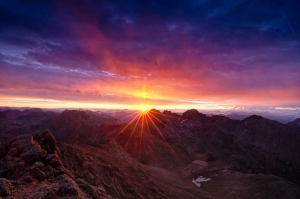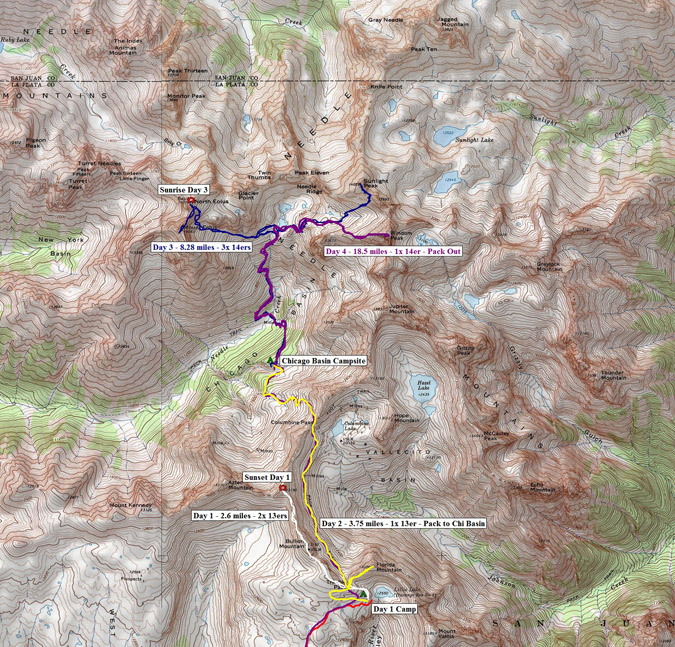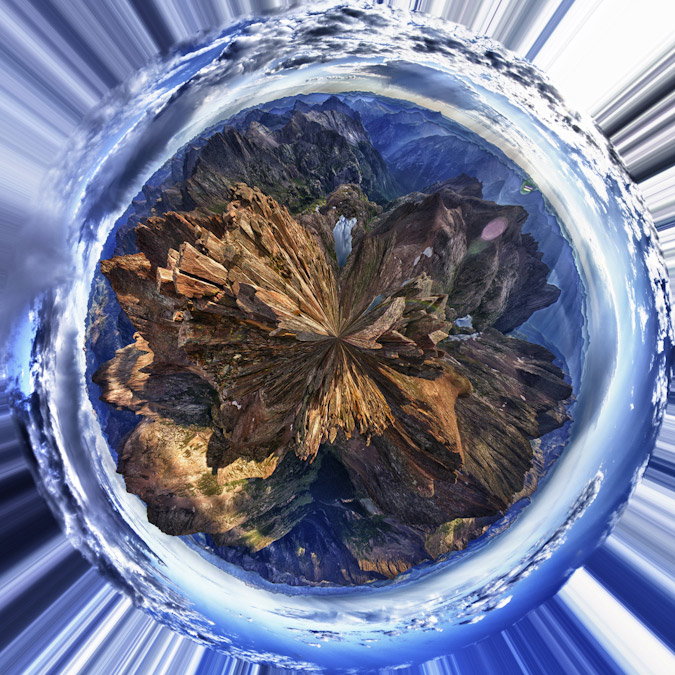Displaying items by tag: Eolus Peak
Colorado's 12 Hardest 14ers to Climb
Colorado's Fourteeners (14ers) are legendary. Each of the 53 ranked peaks offers unique challenges and rewards. They are the some of the most amazing mountains in the world and have been the number one object of adoration for hundreds of thousands of Coloradoans. Indeed, according to the Colorado Fourteeners Initiative (CFI), approximately half a million people attempt to climb a fourteener each year. Climbing 14ers is a dangerous activity; however, good planning, fitness, and awareness of the potential hazards will provide climbers with good opportunities to accomplish these monsterous peaks. Each year I'm usually asked one of two questions - which 14ers are the easiest; and, which 14ers are the hardest? I decided to lay out the hardest 14ers here for you in this article. Let me know how I did based on your own experience. Lastly, it might be a good idea to arm yourself with the most up-to-date information about mountaineering accidents in Colorado. Who knows, reading about these tragic events may just save your life. Additionally, I highly recommend obtaining GaiaGPS for your phone. It allows you to see your track and location on a USGS map overlay even in airplane mode. It has saved me so many times. You can purchase it here and help support the site.
While it may make sense to simply use the only existing data available regarding mountaineering accidents in Colorado to determine 14er difficulty, my experience has been that the difficulty of a peak is more than just cold, hard facts. Indeed, Longs Peak is not nearly as difficult as, say, Capitol Peak; however, it has far more accidents due to the sheer number of inexperienced and/or unaccomplished people attempting it each year. With that being said, I'm going to use a mixture of my personal experience and some subjective ratings to present my case to you. For these ratings it is assumed that the climber is approaching via the standard route in "normal" conditions. I've intentionally left out un-ranked 14ers such as North Maroon and El Diente - assume they can be bundled with Maroon Peak and Mount Wilson, respectively. Additionally, consideration of any traverses between 14ers was not considered for these ratings.
I will rate each mountain's difficulty ranking based on four equally weighted variables:
1. Sustained difficulty: this rating establishes the peak's sustained difficulty over the course of the entire climb
2. Most difficult section: this rating establishes the difficulty of the peak's most difficult section
3. Terrain: this rating establishes the difficulty of the peak's overall terrain, taking exposure and looseness of rock into account
4. Access: this rating establishes the difficulty to reach this peak or how long it takes to get to the top
Feel free to let me know if you disagree with my ratings!
#1. Capitol Peak

While Capitol Peak has only seen two deaths since 2010 compared to five on Longs Peak (as of August 2014), it is arguably the most difficult 14er in Colorado, as I attested in my 2010 trip report. As pictured above in the panoramic taken between Capitol Peak and K2 near the infamous Knife Edge, the terrain is rugged, exposed, loose and dangerous. Not only does Capitol Peak have some very difficult sections, it has, in my opinion, the highest sustained difficulty out of any of the 14ers. The climb up Capitol is relentless and requires mountainners to focus on the mountain's terrain for a very long period of time. There are very few breaks to be had and simple mistakes can and do prove to be fatal. Additionally, Capitol Peak requires a lot of time to accomplish and once you are past the knife edge, you are committed to at least two hours more of climbing. This makes the mountain especially mentally taxing as those are two hours straight of focused climbing on rugged terrain where you also have to keep a keen eye on the weather. Lastly, access to Capitol, while doable in a single day, usually requires an arduous backpacking trip to Capitol Lake and a very early start on a subsequent day. Let's see how Capitol Peak rates in the four domains:
| Sustained Difficulty: 10/10 | |
| Most difficult section: 9/10 | |
| Terrain: 10/10 | |
| Access: 9/10 | |
| Total: 38/40 |
#2. Mount Wilson
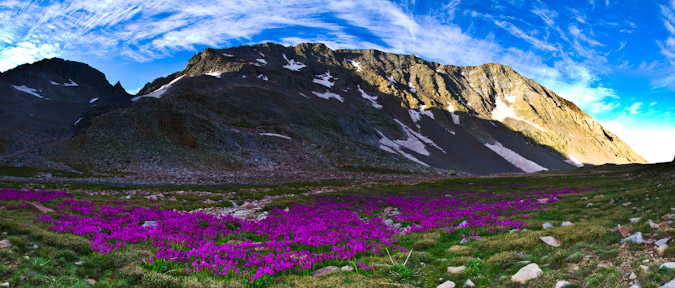
Mount Wilson is easily one of the most challenging 14ers in Colorado to climb - the standard route, while mostly straight-forward, has many difficult sections of very loose rock at the summit. The summit block itself has stopped many people in their tracks, just a few feet from the summit. The exposure there is intense and not for the feint of heart. Examples of this can be seen in my trip report from 2011. In addition to the tremendous exposure found on the summit block, Mount Wilson's approach from the Rock of Ages trailhead is fairly long and quite committing, with a lot of up-and-down climbing (unless approached from Kilpacker Basin or Navajo Basin). The difficult section of climbing found on the upper 1/3 of the route is difficult to negotiate and offers many challenges for climbers of all levels. The rock on Mount Wilson is extremely loose and many people have perished on the slopes between Mount Wilson and the un-ranked beast to the west - El Diente.
| Sustained Difficulty: 10/10 | |
| Most difficult section: 9/10 | |
| Terrain: 10/10 | |
| Access: 7/10 | |
| Total: 36/40 |
#3. Little Bear Peak

Out of all of the Fourteeners, Little Bear Peak is quite possibly my least favorite and least likely to be something I'd like to repeat. The approach is terrible - either a long slog on a rocky road in hot weather or an insane jeep ride over some of Colorado's toughest jeep obstacles (OK - those are kind of awesome). My ascent in 2010 was quite memorable, notably - the infamous "Hourglass" section just about scared me to death. Many people have perished in the Hourglass over the years, including one of the most memorable deaths in the past 5 years - Kevin Hayne. The Hourglass presents some very difficult climbing, with few good hand-holds and potentially fatal ice and water sections, not to mention the hazard of frequent rockfall from above. While Little Bear Peak is very straight-forward and mostly an easy climb, the Hourglass section marks it as one of the toughest mountains around.
| Sustained Difficulty: 6/10 | |
| Most difficult section: 10/10 | |
| Terrain: 10/10 | |
| Access: 7/10 | |
| Total: 33/40 |
#4. Pyramid Peak

Pyramid Peak, while not having many known fatalities, presents some truly heinous climbing obstacles, especially in wet conditions. The rock in the Elk Mountains is notoriously loose and nasty - making it very suspect in down-climbs and even more dangerous in rain or snow. The approach to Pyramid is fairly straightforward, albeit somewhat long and committing once above tree-line. The terrain on Pyramid is steep almost the entire climb and once above tree-line the mountain demands your concentration for the duration. While Pyramid is likely one of my favorite climbs of all time, it is not for a beginner climber and should be taking quite seriously. Of course, the views from the summit are to die for.
| Sustained Difficulty: 8/10 | |
| Most difficult section: 8/10 | |
| Terrain: 9/10 | |
| Access: 6/10 | |
| Total: 31/40 |
#5. Maroon Peak

The photo above was taken from the summit of Pyramid Peak looking out across the valley at the Maroon Bells and their insane stature. The whole area is steep and impressive, which comes with some inherent dangers and difficulties. The Maroon Bells have claimed many lives through the years and are certainly some of the most dangerous mountains in America. Of particular note, the traverse between Maroon Peak and North Maroon has claimed several victims and is a force to be reckoned with. Maroon Peak is a steep monstrosity full of beauty and loose rock as well as an intricate network of rocks, spires and falling rock that a blessing and a curse. Maroon Peak holds some of Colorado's worst rock and even the most experienced climbers have been subdued by the dangerous terrain found there.
| Sustained Difficulty: 8/10 | |
| Most difficult section: 8/10 | |
| Terrain: 9/10 | |
| Access: 6/10 | |
| Total: 30/40 |
#6. Snowmass Mountain

Snowmass Mountain is usually climbed in the early months of summer, when the face of the mountain is mostly covered in snow, making for somewhat easier travel up the snow in crampons; however, the rock beneath the snow is quite loose and is constantly shifting due to erosion. Indeed, Snowmass has proved to be particularly dangerous in the past few years due to these shifting conditions and has claimed a couple lives in the past 5 years. Snowmass' upper slopes contains large white boulders that look secure but are often quite loose and came come crashing down at any moment. The approach on all routes of Snowmass requires quite a bit of travel, which increases the difficulty.
| Sustained Difficulty: 8/10 | |
| Most difficult section: 6/10 | |
| Terrain: 7/10 | |
| Access: 8/10 | |
| Total: 29/40 |
#7. Sunlight Peak
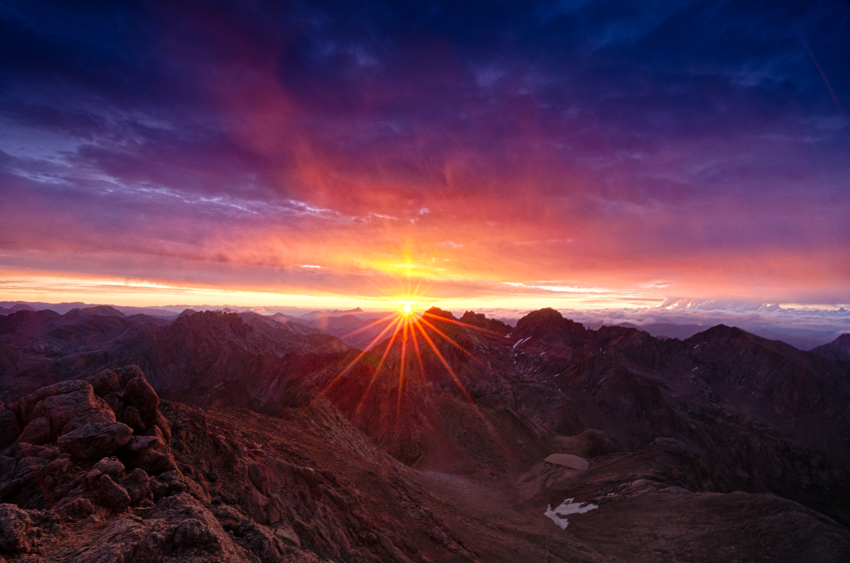
Sunlight Peak is one of the few 14ers requiring class 4 climbing to reach the summit and is generally preceded by a very long backpacking trip and a steep ascent into the Twin Lake basin. Terrain in the Chicago Basin where Sunlight resides is notoriously loose and dangerous as well as highly susceptible to frequent and quickly changing extreme weather conditions. The summit block of Sunlight presents a particularly interesting challenge for climbers and many people skip the summit block altogether if there is any moisture on the rock. Many people may rate Sunlight's next door neighbor, Windom Peak, as being the more difficult of the two; however, I personally found Sunlight to have more challenging route-finding and climbing requirements. Since Sunlight is often paired with Eolus and Windom on the same day and often as the last peak climbed, it presents even more inherent danger as many climbers attempting it are more exhausted than if doing Sunlight on its own.
| Sustained Difficulty: 7/10 | |
| Most difficult section: 8/10 | |
| Terrain: 6/10 | |
| Access: 8/10 | |
| Total: 29/40 |
#8. Crestone Needle

Coming in at number 8 on my list of Colorado's most difficult 14ers to climb is the venerable, impressive and just-plain-freaking-awesome Crestone Needle - my favorite 14er of all. The standard route of Crestone Needle brings you up a steep approach and then plants you right in a series of difficult route-finding challenges and some of the steepest yet most solid rock there is. Even though the rock is quite solid and sturdy, make no mistake - an error in judgement would likly prove fatal, especially in severe weather conditions. Indeed, Crestone Needle has claimed many lives and is a surely one of the most dangerous peaks in the Sangre de Cristo Range. Most approachs require a backpack trip or a very early start and once above tree-line the terrain is quite extreme.
| Sustained Difficulty: 7/10 | |
| Most difficult section: 7/10 | |
| Terrain: 9/10 | |
| Access: 5/10 | |
| Total: 28/40 |
#9. Longs Peak
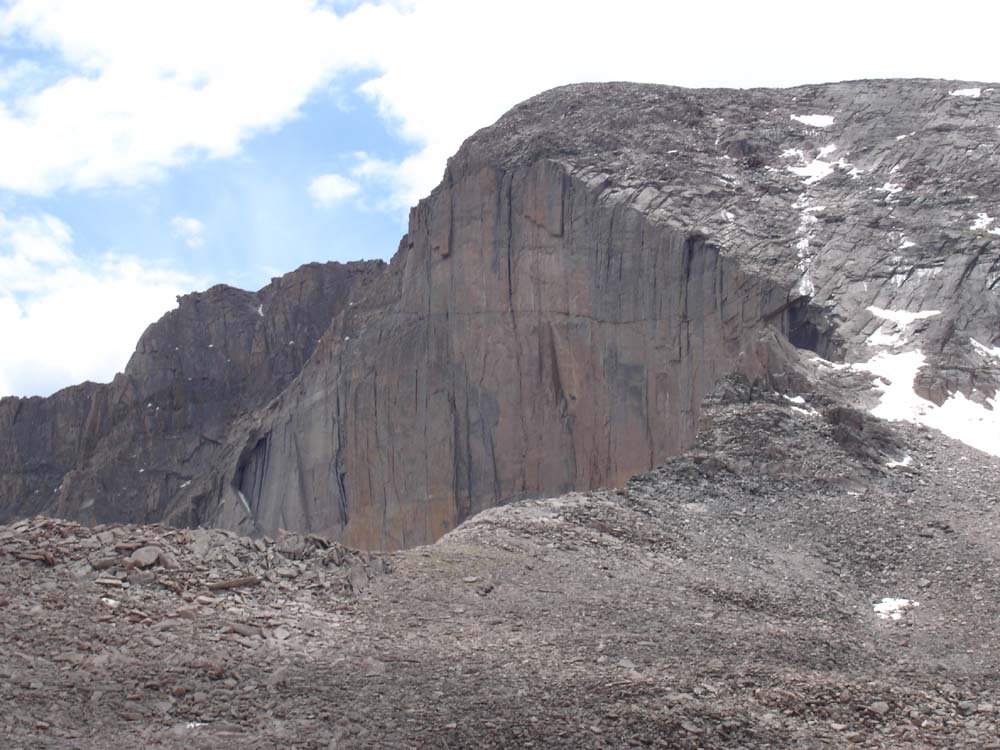
Longs Peak, located within the heart of Rocky Mountain National Park, is likely Colorado's most frequently visited mountain other than perhaps Greys and Torreys. This mountain's location in a National Park makes it a very popular destination by people from all over the world and it often lures inexperienced climbers on its more dangerous upper sections where people find themselves ill-equipped to complete the climb, both mentally and physically. Perhaps the most notable part of Longs Peak's approach is the sheer length of the climb, a full-day affair to be sure. A simple google search of Longs Peak deaths will just tell you how dangerous this peak really is, especially on the upper areas such as the Narrows and the Trough. Additional hazards plaguing this peak are the frequent deposits of snow and ice early and late in the climbing season that often contribute to the dangerous nature of the climb.
| Sustained Difficulty: 9/10 | |
| Most difficult section: 6/10 | |
| Terrain: 8/10 | |
| Access: 5/10 | |
| Total: 28/40 |
#10. Kit Carson Mountain
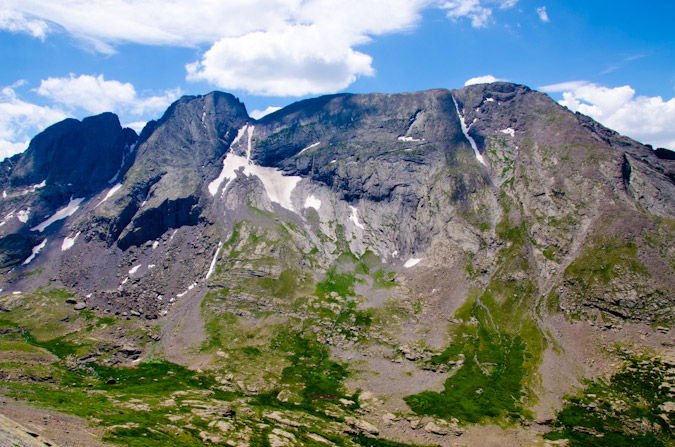
Kit Carson Mountain is one of the Sangre de Cristo giants located right by Crestone Peak and Crestone Needle. The approach to Kit Carson's standard route involves a lengthy backpacking trip and an ascent over the less impressive, albeit quite steep 14er, Challenger Point. The steep approach, coupled with a downclimb mired in confusion and difficult route-finding, makes Kit Carson quite eligible for this list. Several climbers have perished on Kit Carson in recent years, almost always due to off-route climbing.
| Sustained Difficulty: 8/10 | |
| Most difficult section: 6/10 | |
| Terrain: 6/10 | |
| Access: 7/10 | |
| Total: 27/40 |
#11. Mount Eolus
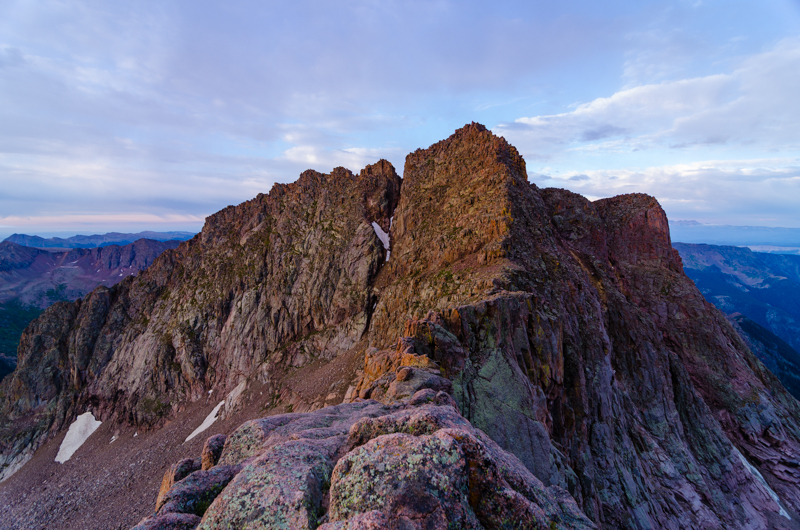
Mount Eolus marks the second of the Chicago Basin 14ers to make this list and arguably the more difficult of the three, despite my lower rating here. Eolus' "Catwalk" and steep, confusing route on the upper third of the mountain make it a top contender. The approach for Eolus is quite taxing as well and many climbers reaching the upper sections of Eolus find themselves out of energy and weakened - a terrible combination when paired with the rugged and loose terrain of the San Juan Mountains.
| Sustained Difficulty: 6/10 | |
| Most difficult section: 7/10 | |
| Terrain: 6/10 | |
| Access: 8/10 | |
| Total: 27/40 |
#12. Crestone Peak
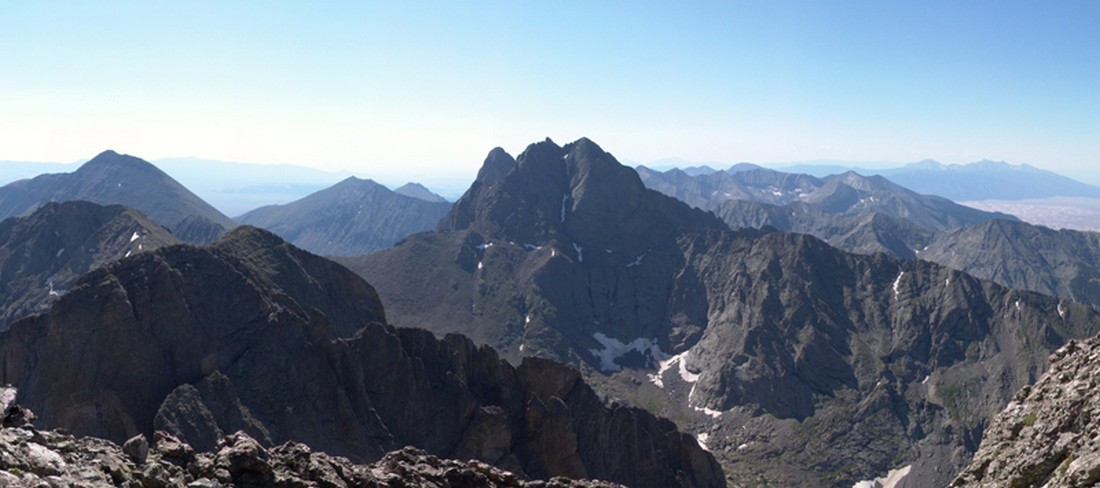
Crestone Peak has single-handedly claimed many climbers' lives over the past several years due to the loose and difficult terrain found on the upper sections of the mountain. While the mountain's standard route is mostly straight-forward, there are certainly sections that demand one's full attention and good climbing skills in order to ensure a successful summit. Like Crestone Needle, Crestone Peak's approach is a very long day up very steep trails and rock formations, increasing the difficulty of this impressive peak found in the awesome Sangre de Cristo Mountains.
| Sustained Difficulty: 6/10 | |
| Most difficult section: 7/10 | |
| Terrain: 6/10 | |
| Access: 8/10 | |
| Total: 27/40 |
How did I do? Would you have rated them differently? How so? I'd love to hear your thoughts!
Sunsets, Sunrises and Mountain Goats - Chicago Basin from Endlich Mesa
Day 1: Backpack from Endlich Mesa to Lillie Lake
Day 2: Climb one 13er, backpacking over Trimble Pass and Columbine Pass
Day 3: Sunrise from North Eolus, summit of Eolus and Sunlight
Day 4: Climb of Windom Peak and pack-out
The Weminuche Wilderness Area and the mountains it contains are quite possibly some of the most incredible places on Earth. My first memory of the area was from 2000, when I led a group of 8th and 9th graders from Highland Mary Lakes to Vallecito Reservoir as part of my employment with Colvig Silver Camps. I remember fondly the views of the Needle and Grenadier sub-ranges and never thought in a million years I'd actually climb them. From many vantage points, the mountains in this area look unclimbable and untouchable. Indeed, the Needle sub-range of mountains which consists of Pigeon Peak, Turret Peak, Monitor Peak, Mount Eolus, Sunlight Peak and Windom Peak were some of the few mountains not explored by the Hayden or Wheeler surveys. According to Rhoda of the Hayden Survey, the weather pattern of the Needle sub-range was quite impressive: "Early in the day we noticed clouds hovering about the quartzite peaks, as we had seen them so often before. They never completely veiled all the peaks in the group, but early each day began to circle about them in a restless sort of way, like so many mighty lions about their lair. To us this apparent restlessness suggested a concsiousness of their terrific destructive power, which only awaited a mandate from the 'God of Storms' to be set in motion. We even now held these peaks in awe, as there seemed to be established somwhere in their midst a regular 'manufactory of storms.'1 Based on this notation, it is no wonder that Mount Eolus is named after the Greek God of Winds. Indeed, the clouds and winds were quite notable this trip, as seen in this preview...
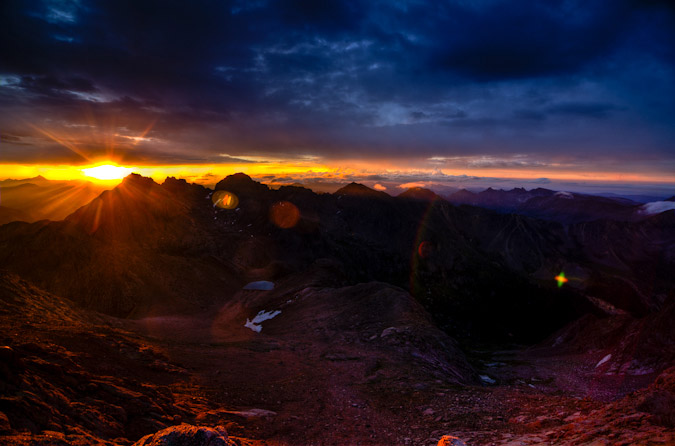
With only five ranked 14ers left to climb, I was eager to finally get into Chicago Basin and climb those restless peaks. The route I chose for this adventure has been in the making for two years now, piecing together various adventures I'd had in the area in the past. In 2001, I hiked from Vallecito Reservoir and to Columbine Pass and climbed Jupiter Peak. In 2000, I did a backpacking trip from the start of Endlich Mesa to City Reservoir. With these two separate trips embedded in my memory, I knew it would be quite an adventure to go from Endlich Mesa to Chicago Basin and back. Adventure indeed.
45 miles round-trip.
16,600 ft. elevation gain.
4 days.
Here's a map of our adventure - please click on it to see the full version (including the rest of the map that you can't see here):
Day 1: Backpack from Endlich Mesa to Lillie Lake; summit two 13ers - 13.1 miles, 4,083 ft. elevation gain.
Two years ago, I had planned to do this trip with my dad. The Chicago Basin 14ers were three of the seven 14ers he had not climbed and I wanted to share those summits with him. Unfortunately, he suffered a freak knee accident this past Christmas and has not been able to hike this year, so I planned the trip with my new friend, Regina. Another set of unfortunate events happened, and I had a last-minute scheduling conflict on the dates Regina and I had chosen for the trip; however, another freak incident happened and I was able to clear some dates on my calendar and go on the trip with another friend, Sarah Musick. I explained the somewhat insane trip plan with Sarah and she bought-in right away, knowing that it would be a monster of an adventure. The plan was to drive to the Endlich Mesa trailhead on Thursday night, backpack as far as possible on Friday, backpack to Chicago Basin on Saturday, climb the 14ers on Sunday and Monday, and backpack all the way out on Tuesday for the drive home. It would be a feat no matter how you looked at it. The only positive to the approach was that we would be starting at 11,250 ft. elevation! All packed and ready to go on Wednesday night, I weighed my pack - 58 pounds! This was going to be painful! Sarah and I had opted to eat well this trip, so the bulk of the weight was in food, but trust me, it paid off later! So - off we went from Colorado Springs for the Endlich Mesa trailhead, which was up a long 9-mile forest service road north and east of Lemon Reservoir near Durango, Colorado. Earlier in the year, I had gotten some great information from Barry Raven from 14ers.com about how to get to the trailead - HERE is the map he shared with me, which I found highly useful in finding the trailhead in the dark.
We slept in Sarah's truck and set our alarm for 5:00 AM, which came after a night of rain. We secured our gear and kissed civilization good-bye. I had pre-prepared some an awesome breakfast for us to cook consisting of bacon, scrambled eggs and hash browns; however, neither of us were remotely hungry, so we opted to pack it in and eat a late breakfast somewhere on the trail. More pack weight! We ascended the Endlich Mesa trail fairly quickly in the early morning and reached the expansive and flat Endlich Mesa in no time at all, with views in all directions.

To the east, the mesa dropped off and revealed some pretty country.
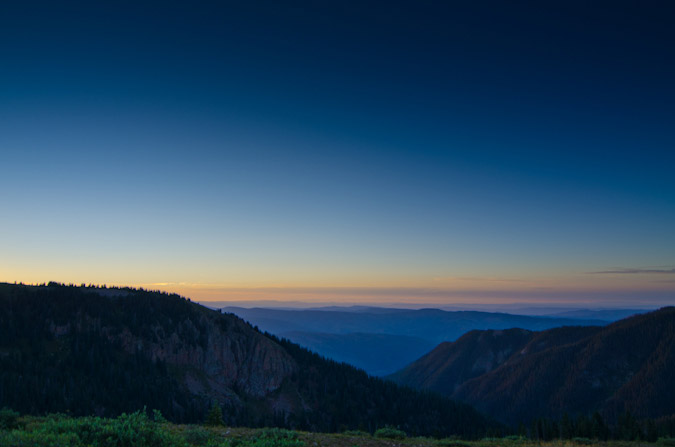
Before too much longer, I was filled with glee as the first views of Pigeon Peak's east face were revealed, as well as the mountains of Chicago Basin. How far away they looked!
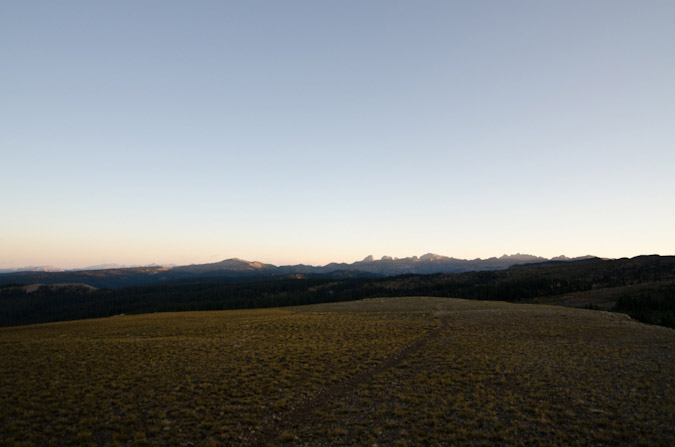
I was really excited to finally use my new camera lens, the Tokina 11-16 f/2.8 super wide angle. It is the highest-rated and best-reviewed wide angle lens for the Nikon DX format camera on the market. The lens is really hard to get these days because of the earthquake and tsunami that hit Japan. I was able to score one from Craigslist and have been itching to get it into action!
The wide angle view was really awesome and I knew I was going to have a lot of fun on this trip. Just in case, I had packed my 18-105mm lens for other shots. Oy vey! More pack weight! Sarah's pack was pretty heavy too, but she was a real trooper!
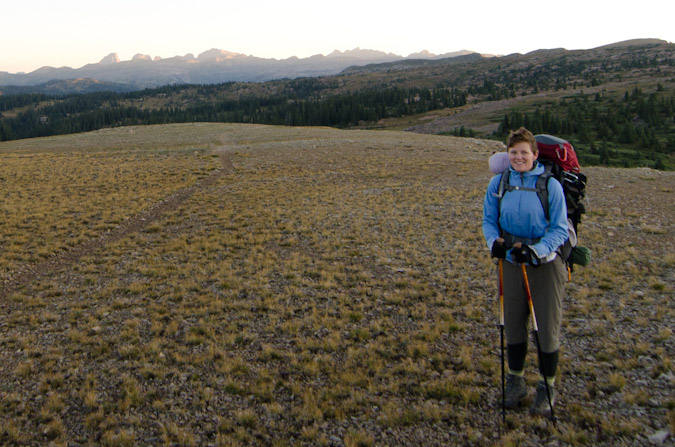
The mountains behind Sarah were indeed the mountains we were aiming for. Wow. Just wow.
We continued up the mesa, which was a very fun approach. It was mostly flat, with a few sections of up-and-down. The views were great the whole way in.
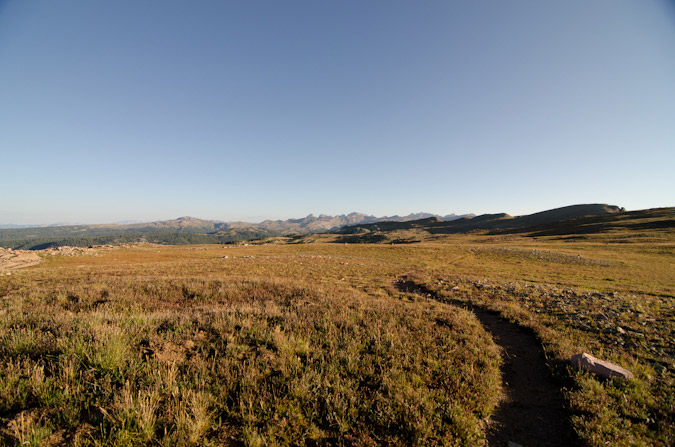
Sarah was able to capture just how geeked-out I looked for the hike...
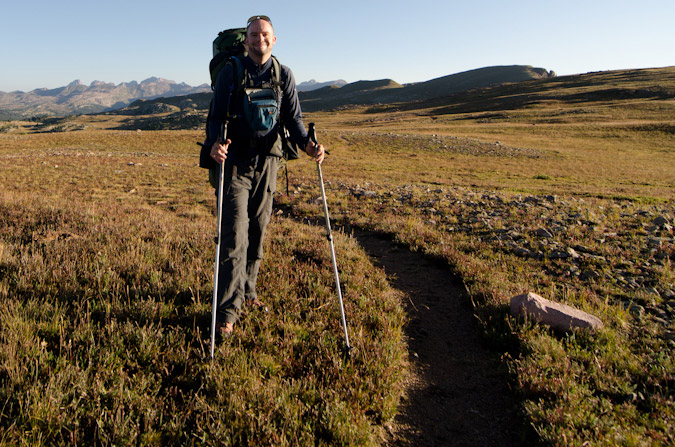
We continued on and after enjoying some spectacular views from the mesa, headed on down towards City Reservoir, where we planned to cook some breakfast. The hike down to the reservoir was steep, and we both knew it was going to be one hell of a hike back up at the conclusion of the trip.
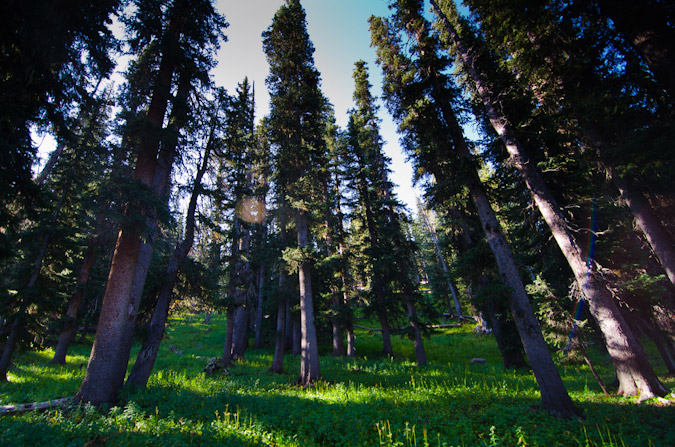
We stopped at Durango City Reservoir and enjoyed the early morning light on the water.
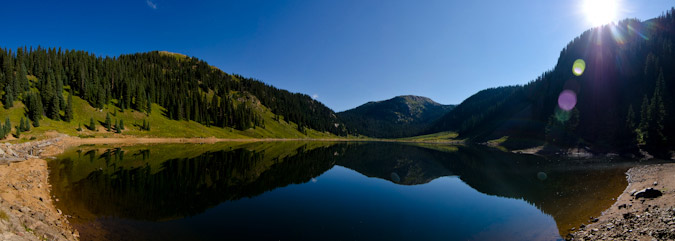
The Soup Nazi unpacked and prepared breakfast.
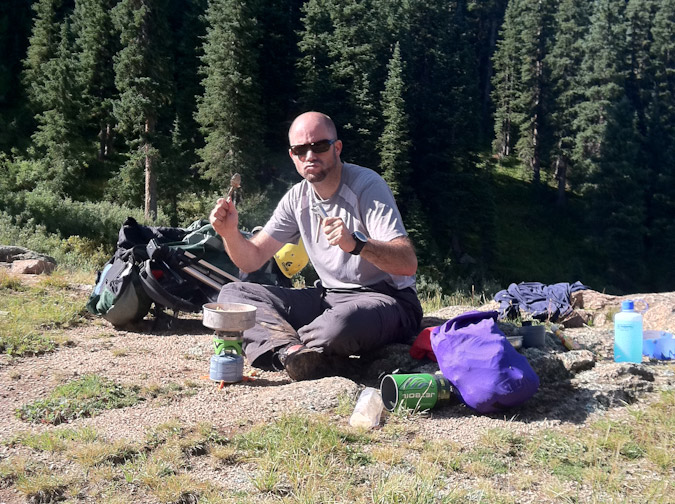
No Soup for YOU!
The breakfast was amazing. Two other backpackers passed us on the trail, one of which I later learned was "alwetend" from 14ers.com. These two guys had on packs that weighed at most 30 pounds and looked as though they were in lightweight ascent shoes. Jealousy set-in. We packed up and headed-out. For some reason, we felt like we were both moving much slower than before. It must have been the bacon. The trail heading up towards our second objective for the day, Lake Marie, was pretty steep (with heavy packs on anyways). We passed by the entrails of something on the way, perhaps a deer? Or perhaps someone with a heavy pack on puked their guts out... thanks Sarah for taking a photo!
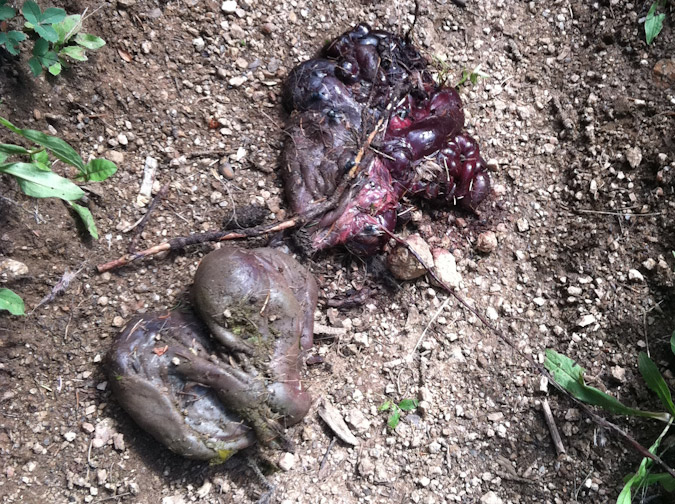
At 11:30 AM we reached Lake Marie. Above it to the left (west) was Silver Mesa, where we were heading next. Above it to the north was Florida Mountain, which had at its base City Reservoir #2 aka Lillie Lake.
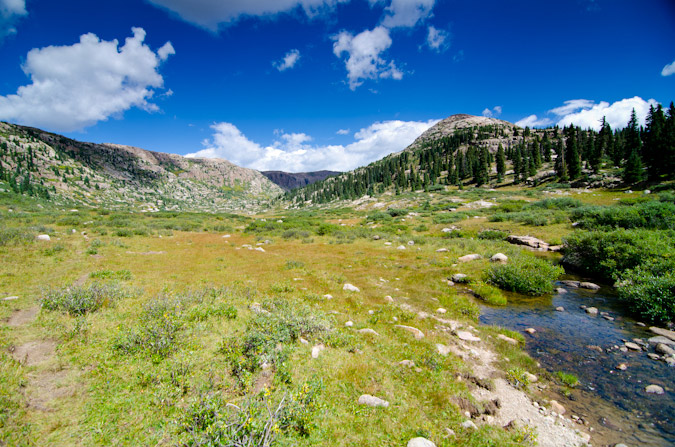
Climbing up to Silver Mesa was pretty straight-forward. The trail was clearly marked and it followed the USGS topo to a tee. Once on the second mesa of the day, we knew we were committed. We knew that our day's fate was sealed and that we needed to find a campsite somewhere between here and Trimble Pass before dark. I had my sights set on Lillie Lake, which was just below Trimble Pass. While exposed to the elements at such a high elevation, it was a great location to aim for due to the presence of water. So we worked our way up the Mesa at a slow pace. Huge cairns marked the way the whole way in.
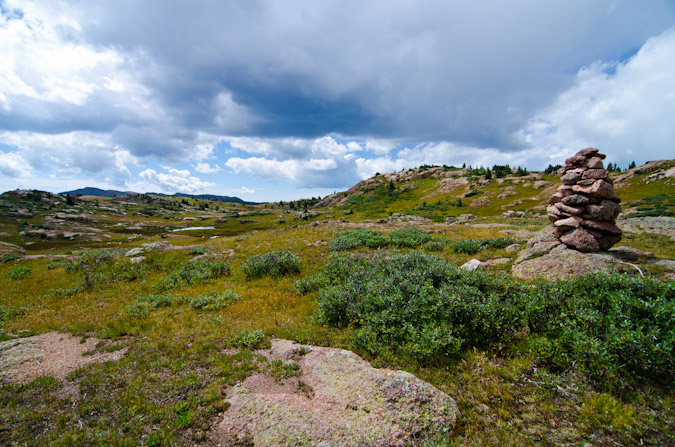
Storms moved in and we put on our rain gear. Fortunately, it did not rain for long...
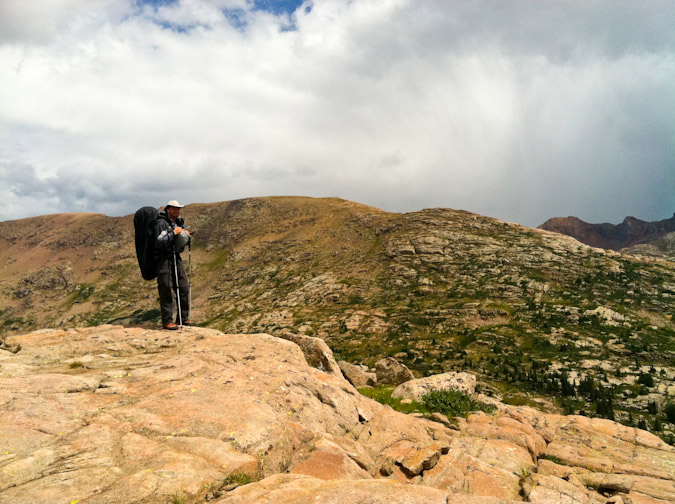
We reached a nice stopping place about halfway up Silver Mesa. Lake Marie was seen far below and the summit of Florida Mountain was seen far above. Here's a nice view of that whole scene in a 360 panoramic, with the lake to the left and the summit to the right.

At this point we were both pretty delerious and tired. Everything was funny.
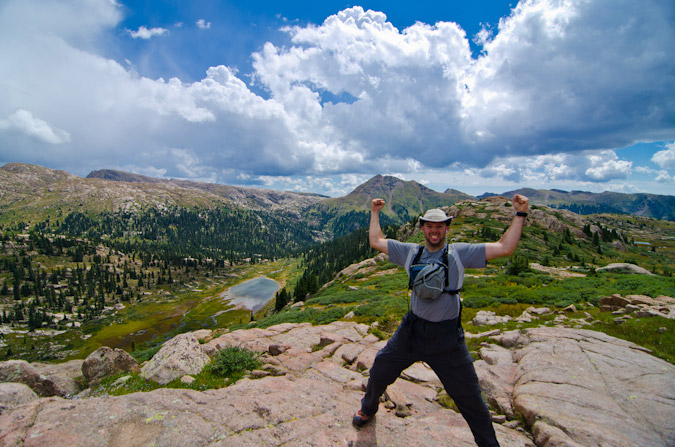
We soldiered on up Silver Mesa further, which provided literally a highway of silver for us to hike on and up through a large notch.
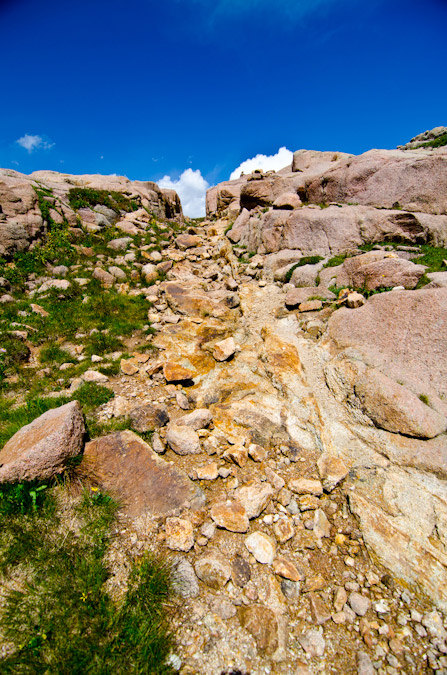 We stopped again about 3/4 of the way near the Pittsburgh Mine and ate some food. Sarah swears I was meditating in this photo, but I'm pretty sure I was just enjoying the views!
We stopped again about 3/4 of the way near the Pittsburgh Mine and ate some food. Sarah swears I was meditating in this photo, but I'm pretty sure I was just enjoying the views!
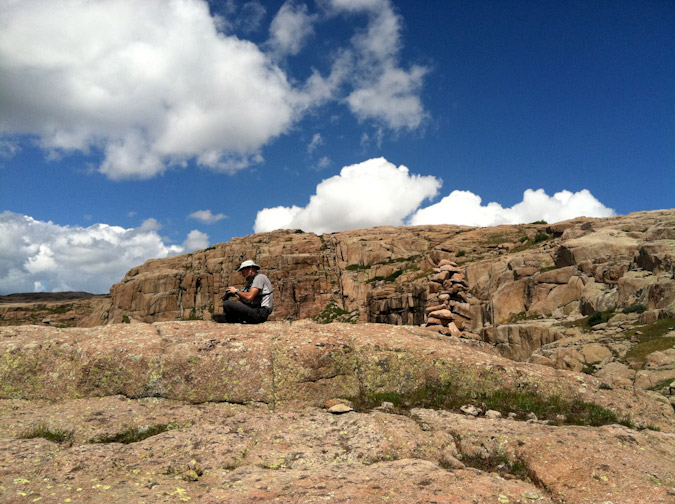
Indeed the views back to the south of Endlich Mesa and Sheridan Mountain were great, and it really put things into perspective in terms of how far we had already hiked. The large map I linked to early in the report really gives you a great idea of this as well.
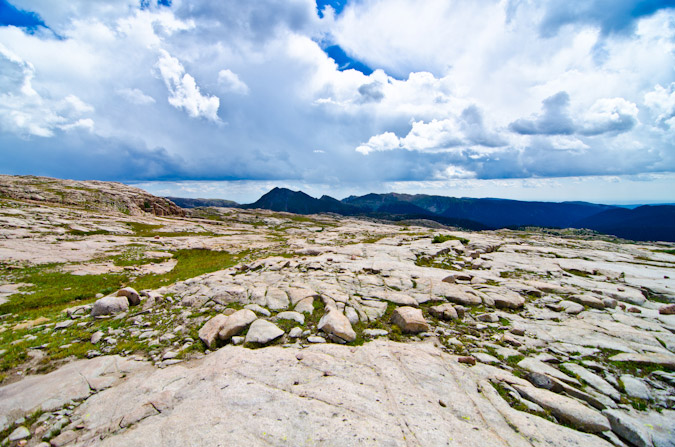
Break time was over and onward we trekked to Pittsburgh Mine, which I had vague recollections of for some reason. I'm not sure if I had visited this place before, but was awfully familiar to me. At any rate, the mine was great. It still had a great deal of equipment and huge holes to look out for. One spot was easily 30-40 feet deep, and Sarah and I marvelled at it for a few minutes.
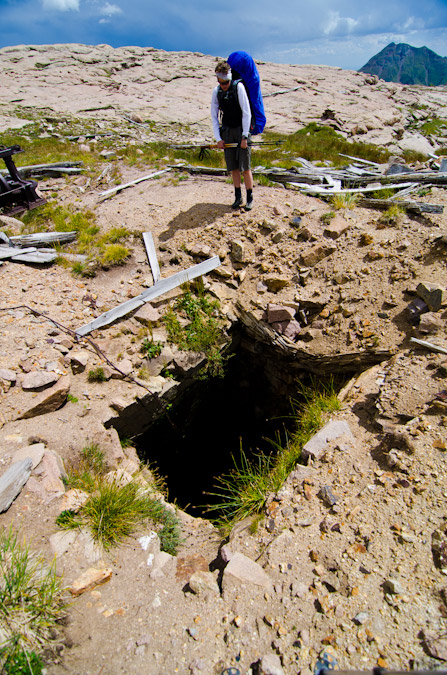
The whole area looked like a tornado hit it. Maybe it was the God of Wind, ÆOLUS (actual spelling on the Eolus summit marker)!
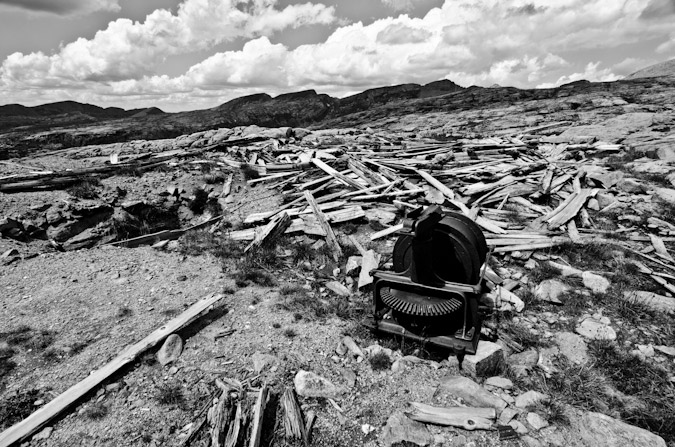
In a way, the scene really made you feel like an old miner.
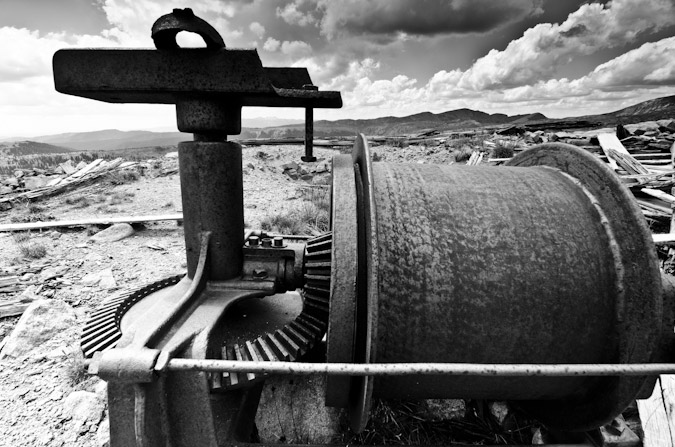
Once past the mine, we were almost to Lillie Lake. We could taste it. Sarah stopped me to ask how much further. I looked at the GPS and told her, "one more mile." This turned out to be the joke of the trip, as it really turned out to be more like two miles since my estimation was as the crow flies. On the way to the lake, I stumbled upon a family (flock?) of Ptarmagin, or snow chicken, which are surprisingly approachable since their only known predator is the golden eagle. This was a rare instance where I did not want the wide angle lens, but it would have to suffice.
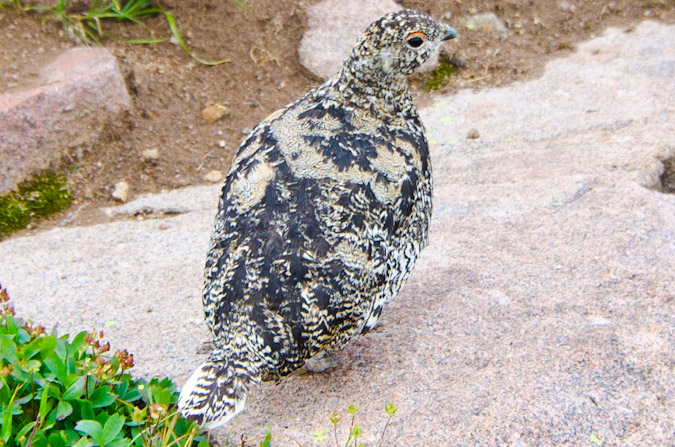
We continued on and found several small pools on the way.
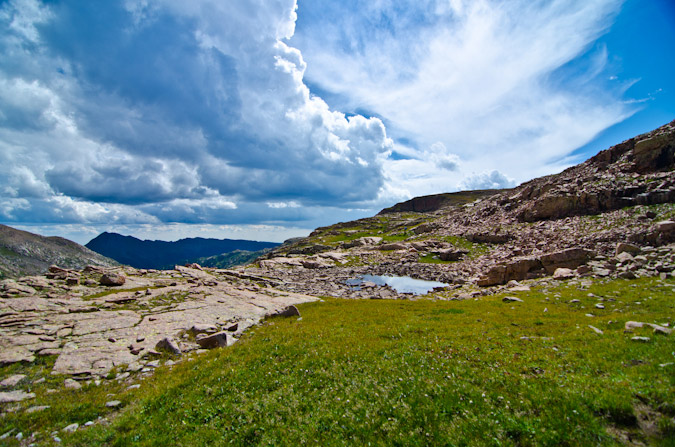
We reached Lillie Lake, a mere 10.5 miles from the start of Endlich Mesa trailhead, and found an amazing campsite just above the lake to the west. The campsite was nestled against a large cliff about 50 ft. high, and surrounded on all sides by ramps of rock except to the south, which led to a cliff overlooking the Marie Lake drainage. We were beat and we were starving!
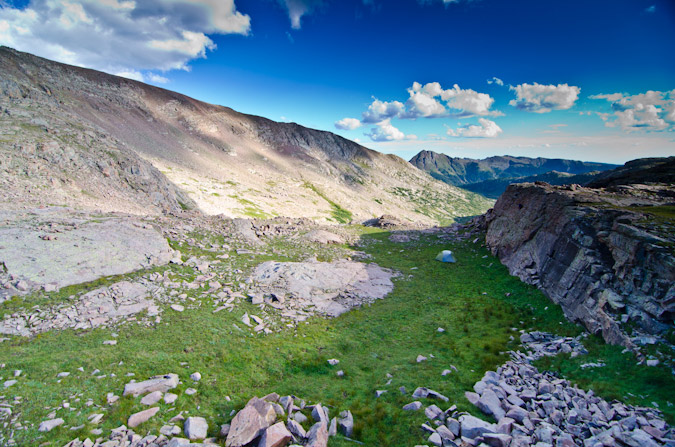
We cooked up our first dinner of the trip - pasta alfredo. It was so good, but I really struggled to put away my half...
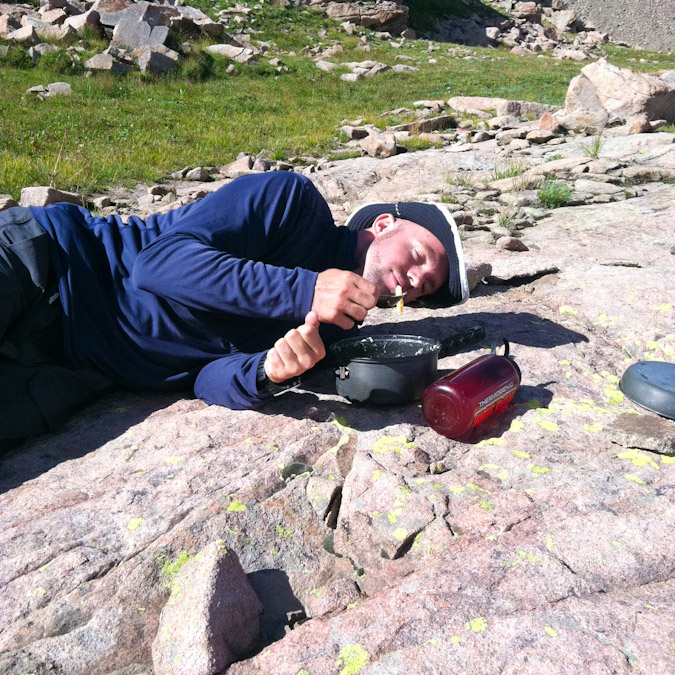
Since there were no trees above tree-line (imagine that), I thought of a great way to hang our food on the 50-ft. rock wall. I had read about this method in a trip report posted on 14ers.com for Pigeon Peak and it worked great! We used a large rock at the top as an anchor and suspended the food bags on the rock wall.
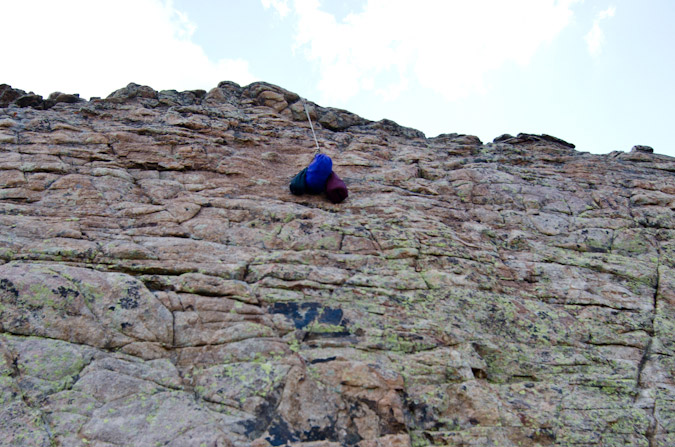
Having refueled and rested, I somehow convinced Sarah that we should climb a 13er and watch the sunset from it. So, away we went with small day-packs, water, a camera and a tripod. We made our own trail above the lake and bushwhacked up to Trimble Pass, where our first close-up views of Chicago Basin were found, with much jubilation.
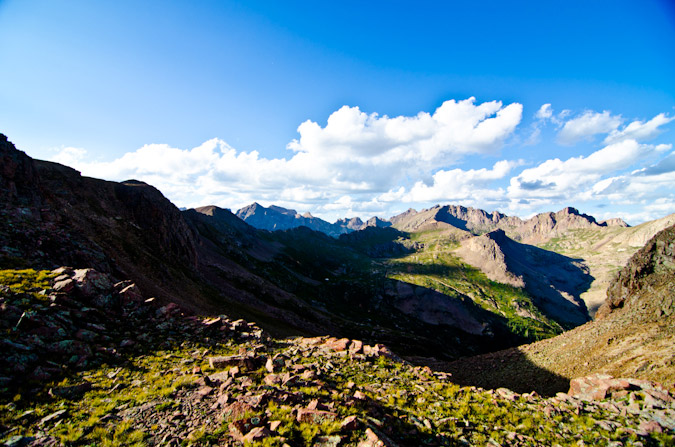
Our attention was turned to the northwest, to Bullion Mountain's 13,182 ft. summit. This would be our target 13er. Bullion is the slightly steep sloped mountain on the left.
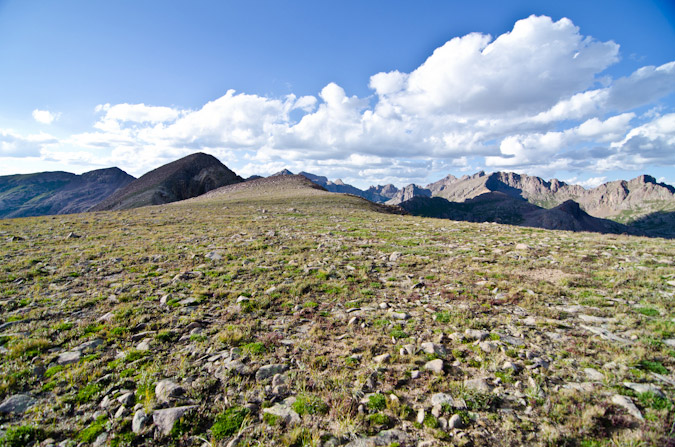
Sarah and I cranked it out on weary legs. The views back south were sobering. We had really come a long ways in one day.
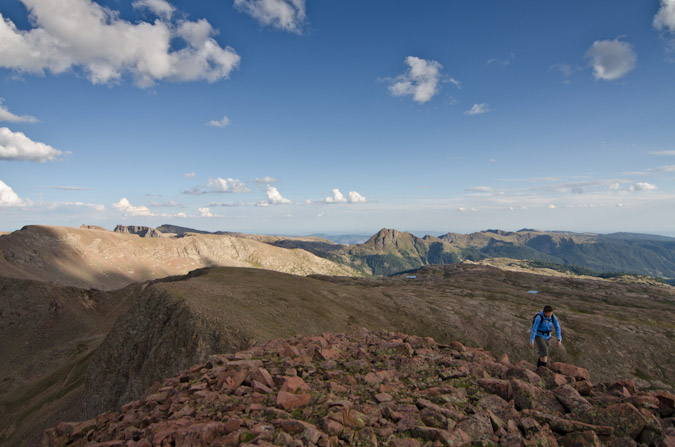
We reached the summit of Bullion Mountain in just 40 minutes and realized we had plenty of time and legs left. I set my sights on un-ranked, un-named point 13,190 to the north, as it would provide superb views of Chicago Basin. The ridge looked like it would go just fine, with maybe one tricky section to navigate across.
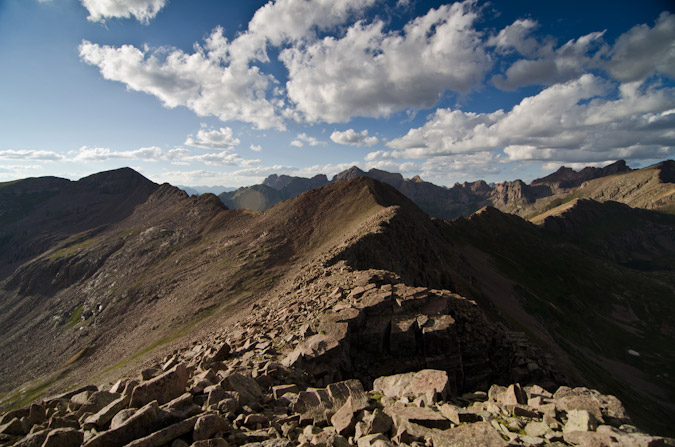
The views of Columbine Pass and Columbine Lake were great from Bullion Mountain, as were the Chicago Basin 14ers and the mighty 13ers Jupiter Mountain and Grizzly Peak.
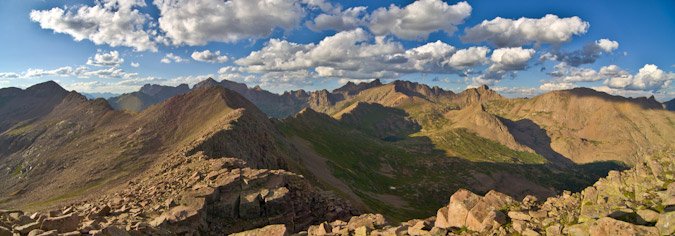
About halfway across to UN 13,190, we stopped to admire the constrasted view of Johnson Creek below and the towering wall that is Organ Mountain and Amherst Mountain to the east. Organ Mountain demanded our attention and respect for the remainder of the trip. Sarah was particularly mesmerized by its impressive stature and was drawn to gaze upon it repeatedly. Organ Mountain is the pointy peak one mountain to the left of the furthest mountain on the right-hand-side of the photo (Amherst Mountain).
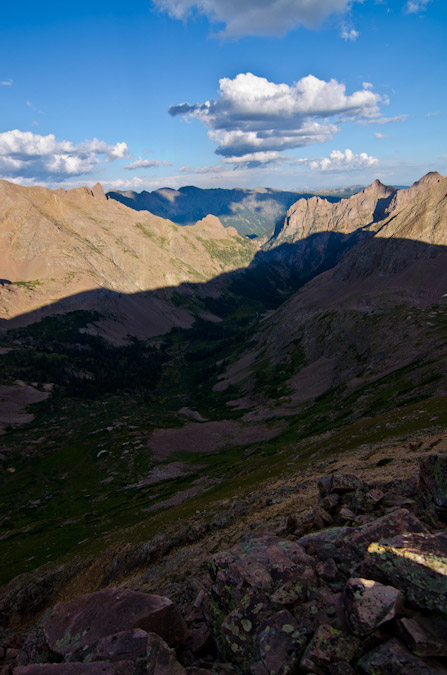
Indeed, Organ and Amherst were impressive peaks. Back in 2001, when I had backpacked up Vallecito Creek and Johnson Creek with my parents, I had admired them tremendously from below, and I even recalled taking several photos of them with my crappy 35mm camera at the time. I was able to dig one of those up and scan it.
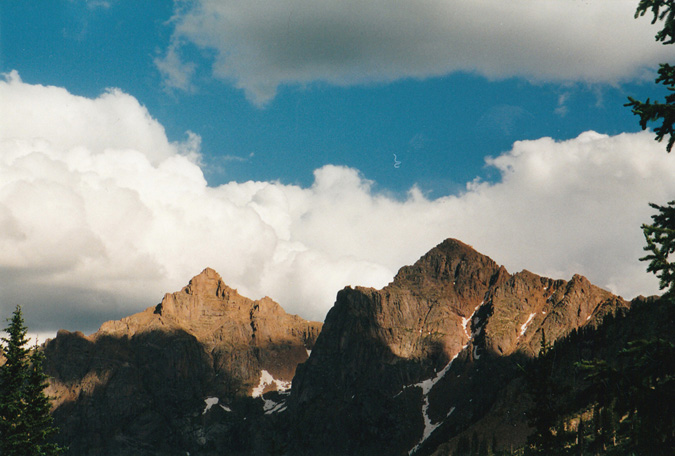
Sarah and I kept on trucking, and encountered a fun yet challenging section of the ridge that required some class 3 climbing. We easily manuvered that section but wondered how fun that would be in the dark later on. The Chicago Basin 14ers were still looking great in the late day sun.
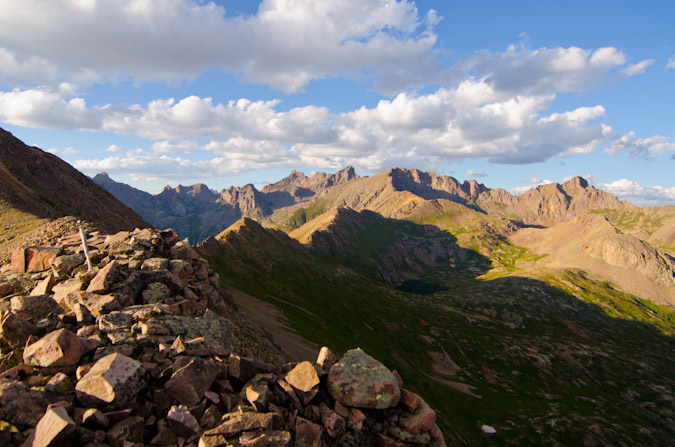
We slogged up the scree slope to the top of UN 13,190 and celebrated. 10.5 miles of backpacking plus two 13ers was a pretty impressive day.
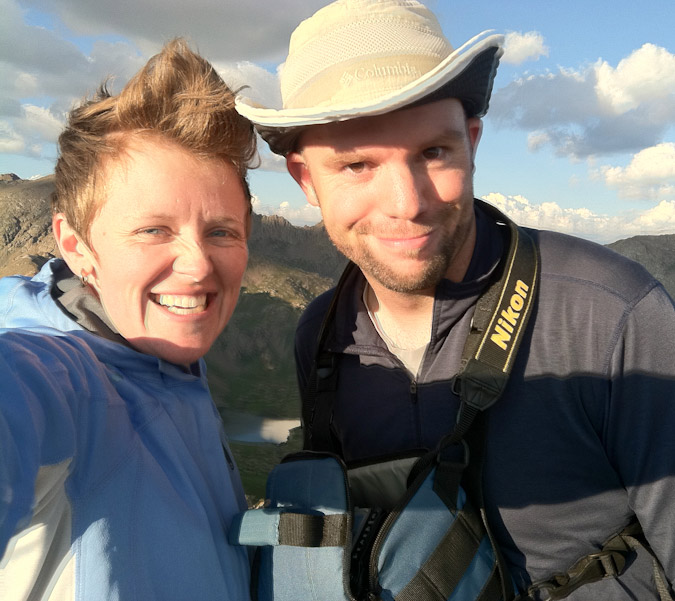
I promptly set-up my tripod on the summit and began taking some photos. Having a tripod on top of a mountain offers some pretty good advantages, starting with consistency. The ease in which photos are to take using a tripod, especially panoramic photos, is well worth the effort. Additionally, the quality of photos increases a great deal. Here's a 360 panoramic from the summit, with the sun cresting over Aztec Mountain (which I wanted to climb so badly, but we ran out of time and energy):

A tripod also makes it easier to do self-timer shots with groups of people, which we took advantage of! This is a view looking north at Chicago Basin and Columbine Lake. You can really appreciate the wide view afforded by my new lens.
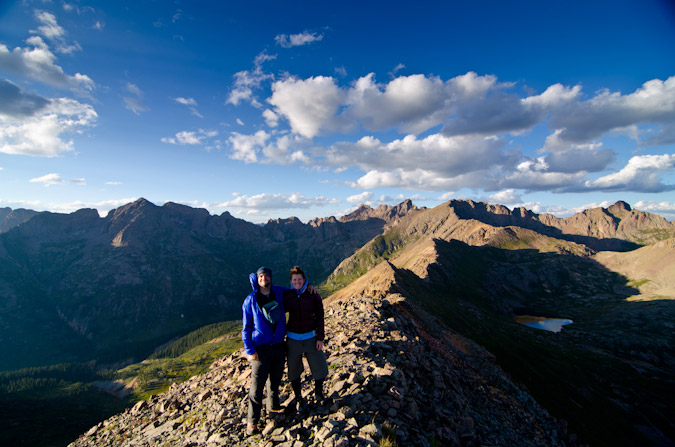
For the photography geeks out there, one of the cool things about this lens is that it has 13 elements in 11 groups, which can make for some really great star-burst effects when stopped-down to f/22. The small aperture makes for a really small hole for the light to pass through, and the result is a diffraction spike, which are also explained HERE. Check out my results:
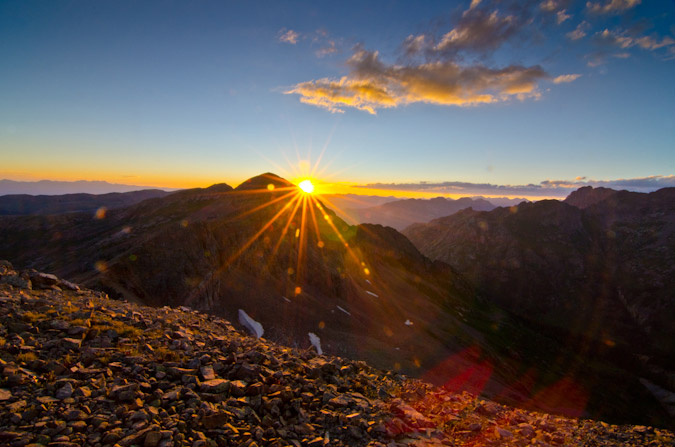
Sarah got to play witness to all this photography geeking-out and documented it with her super-awesome iPhone camera.
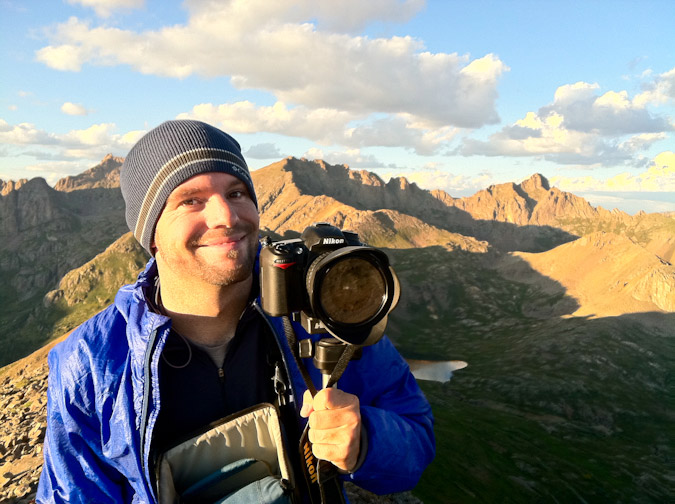
The sun continued to set and the moon began to show itself as well. It was a new moon, and it looked really great in the darkening sky. I captured Sarah witnessing her first sunset from the top of a mountain in HDR. Her words: "one of the five greatest moments of my life."
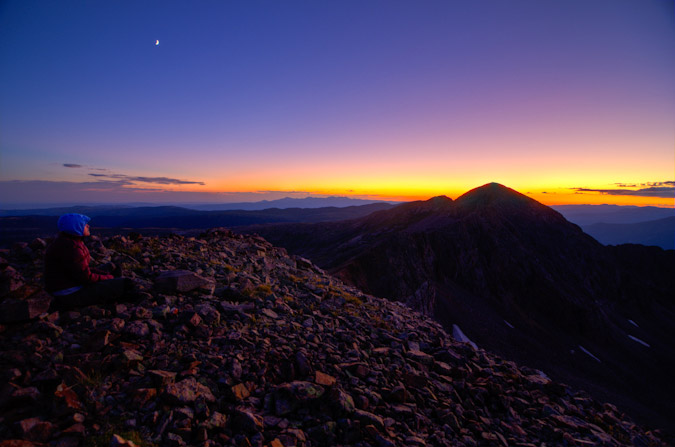
I was a pretty happy guy too, having witnessed only one other sunset from the summit of a mountain, which was from Arrow Peak last year, as documented in THIS trip report.
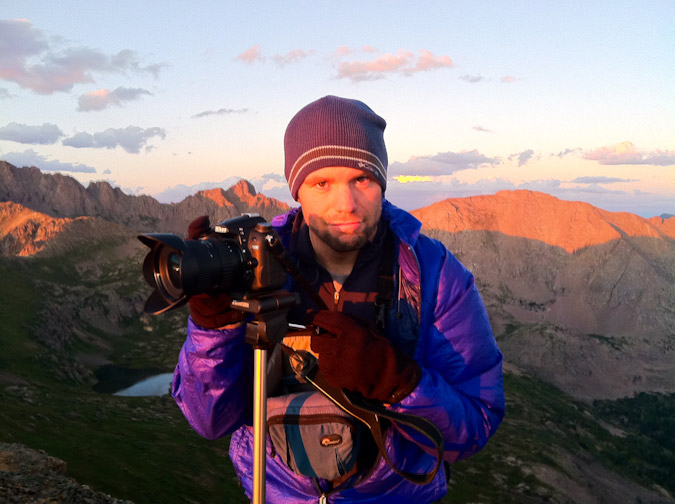
I tried my hand at my first HDR panoramic of the trip, which I believe turned out pretty well. Chicago Basin looked awesome.
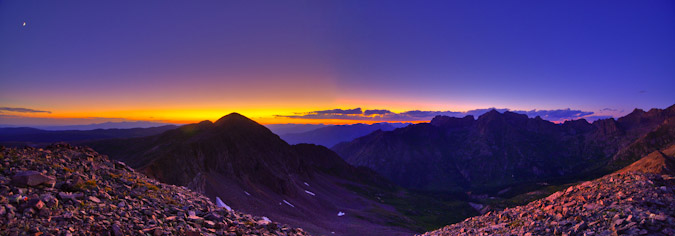
Having witnessed her first sunset from the top of a mountain, Sarah was elated. I took full advantage of this and convinced her that we should stay on top for another hour or two to watch the stars and the milky way (and for me to photograph them). I was really glad she agreed, and we made sure we were bundled up for what we knew was going to become a cold night on the top. A thunderstorm boomed in the far distance behind Chicago Basin, and lit up the clouds behind it in the dark.
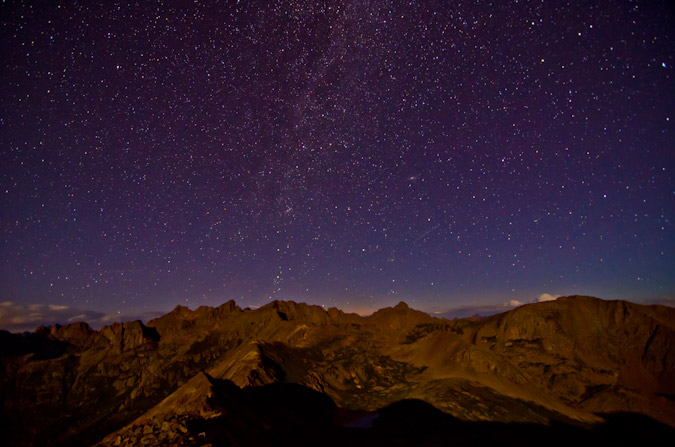
Before this trip, I did a little homework. I read some blogs and watched some videos on shooting stars, specifically the work of Ben Canales, who won the National Geographic Traveler's photography contest. This video of his, was very helpful for me, and I learned two tricks from it. The first trick was the 600/focal length rule, which basically states that when shooting stars in photography, to get a shot without blurry stars from star movement, you can shoot a maximum of x seconds, where x = 600/your focal length. In my case, I was shooting at 11mm, so I could shoot almost a full minute exposure without star blur. The second trick I learned was to take test shots at your highest ISO (in my case 26,600) to look for good shots. Check out his video for more! I wanted to get a good shot of the Milky Way with my new lens. At f/2.8, I could really gather a lot of light and it proved worth the investment.
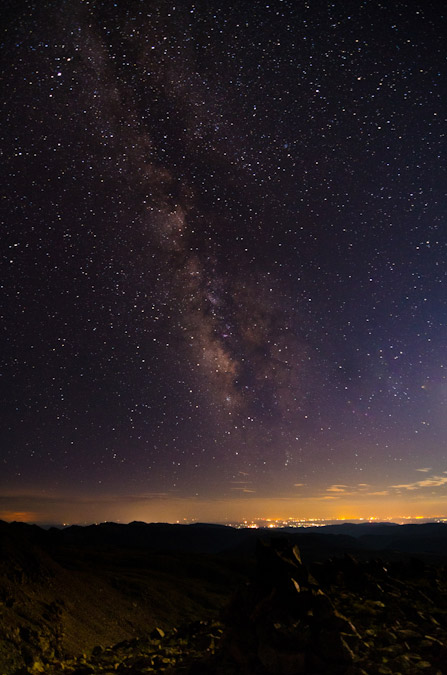
Lastly, I wanted to get some fun star trails over Chicago Basin, and again this proved quite effective. I only did it for about 30 minutes, so it is not as impressive as it could be; however, we needed to get some rest for the big day ahead of us. For this shot, I found the North Star and centered the shot on it. To locate the North Star (which is stationary in the sky, and appears as a pin-point in star trails), find the big dipper. The two bottom right stars that comprise the Big Dipper form a line that points to the North Star.
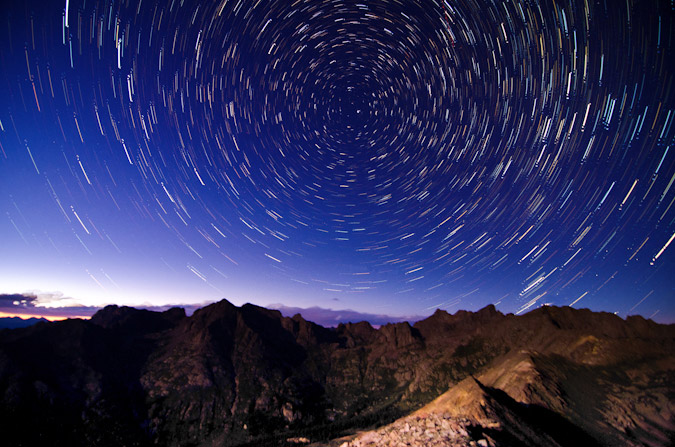
I also decided to throw together a really short time-lapse of the sunset with the stars. Someday I'd like to do a full day's worth!
We head back over to Bullion Mountain in the dark and were able to find out campsite without any problems. Its funny how good of a memory your mind has, even in the darkness of night. We crashed and slept in, letting the heat of the morning sun wake us up.
Day 2: Climb one 13er, backpacking over Trimble Pass and Columbine Pass to our campsite in Chicago Basin - 800 ft. elevation gain with 1,750 ft. lost, 3.75 miles.
Having a good night's sleep, we were able to quickly pack-up our stuff and eat some breakfast bars. I took a quick hike up to Lillie Lake for one last view before our departure. It was an awesome place and I was happy to have visited it. Lake Marie sat far below, seemingly waving us goodbye, for now...
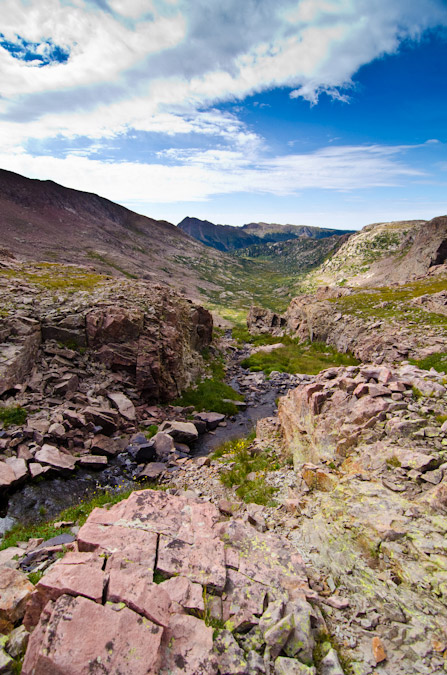
One cool fact about Lillie Lake - it is the headwaters for the city of Durango's water supply - the Florida River - and sits beneath a relatively unimpressive 13er, Florida Mountain, which we had our sights set on for the start of the day.

A better view of the area, with our campsite at far right -
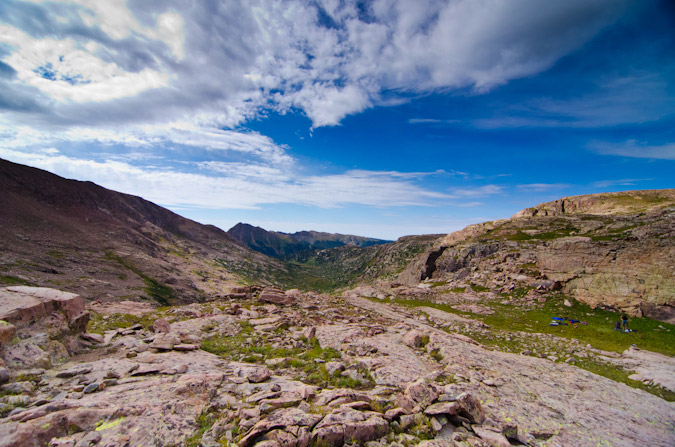
We packed up and trudged up to Trimble Pass. We left our packs here and strolled up to the summit of Florida Mountain's 13,076 ft. summit to enjoy views of Chicago Basin and Johnson Creek.

Sarah was especially excited to be on top of her fourth 13er, all with me.
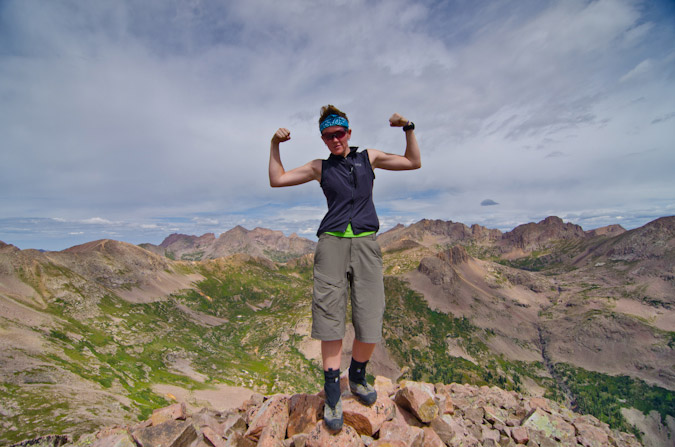
It even had a cute little benchmark on the top, which was fairly unique.
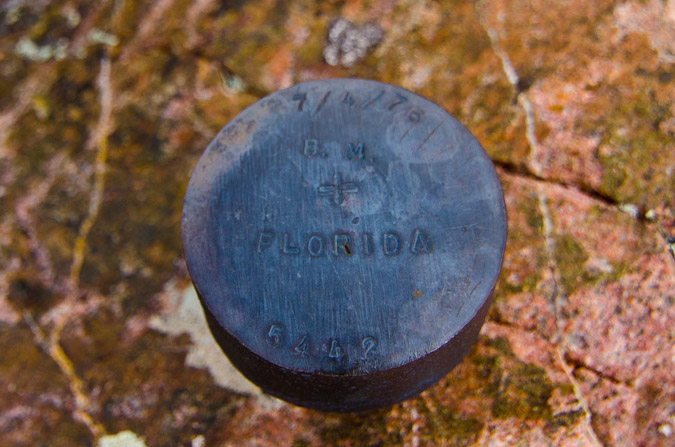
Lillie Lake was especially pretty from this vantage, and was nice to see in actual sunlight...
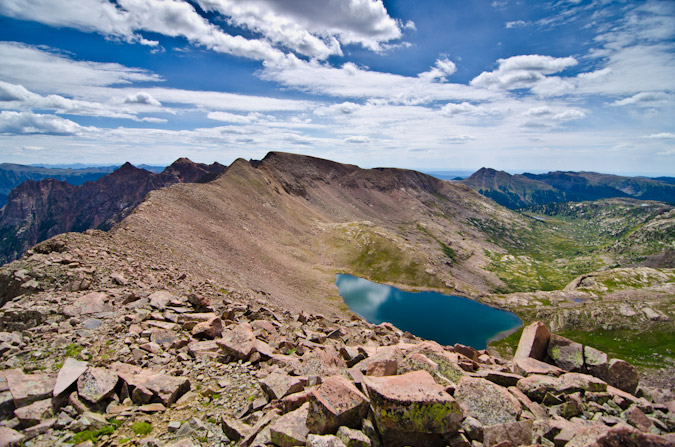
We returned to our packs and began the arduous journey over to Columbine Pass. This section of the hike was quite pretty. We really loved the views from here and only passed two other hikers the whole way over. Looking back on Trimble Pass - we had already come a long ways...
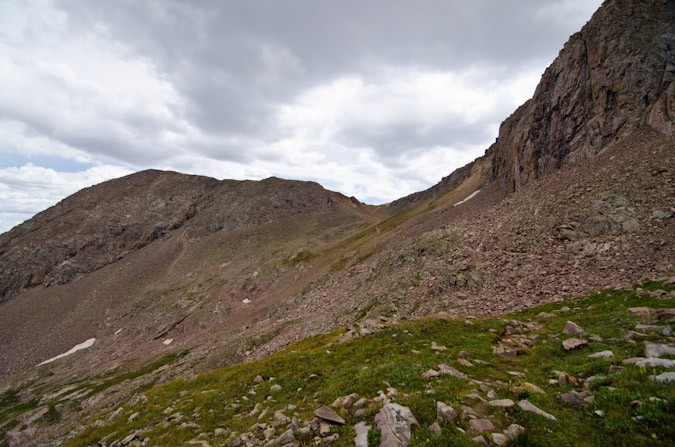
... but we had a long ways to go yet before the top of Columbine Pass. We'd have to return this way? Yikes.
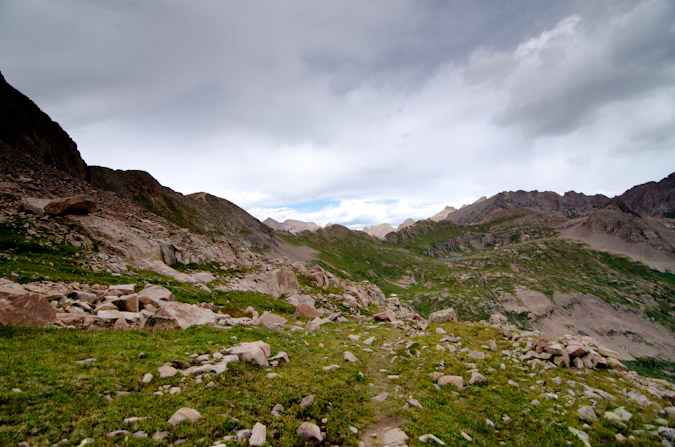
Organ Mountain still drew our attention and made for quite the scenic backdrop to an otherwise desperate slog under the weight of our monstrous packs.
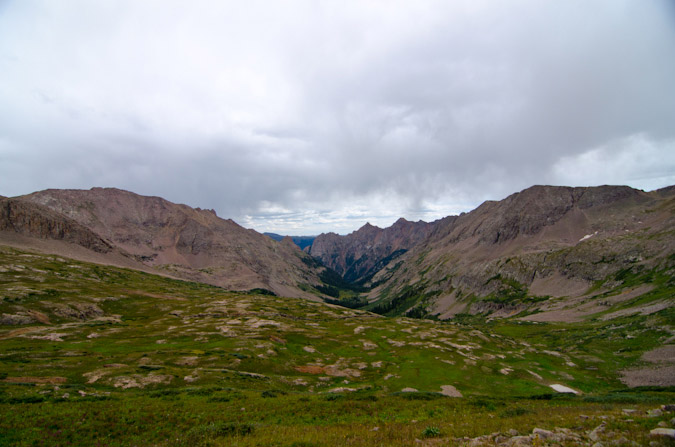
Amazingly, there were still quite a few wildflowers in this basin, and they provided quite a lovely foreground for Columbine Lake and the Chicago Basin '3' -
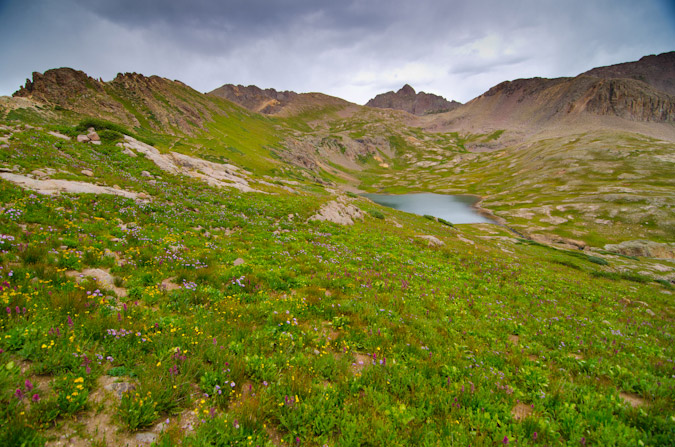
The flowers also proved to be quite a nice foreground for Trimble Pass and the rugged Organ Mountain.
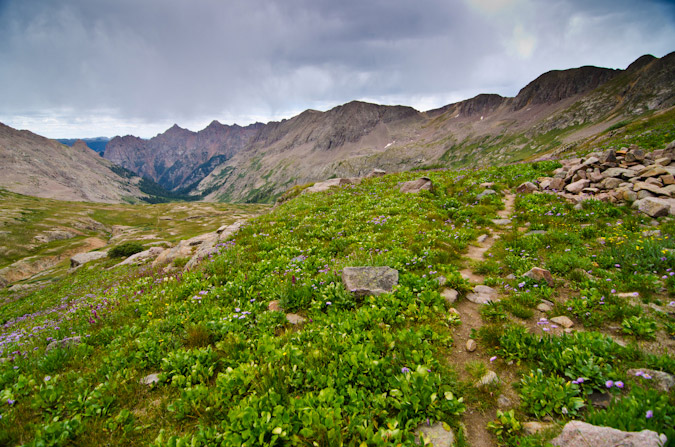
At 1:30 PM, just three hours after we left camp, we had arrived at Columbine Pass. We were greeted to Chicago Basin by wind, rain, and thunderstorms, which all quickly subsided. Storm clouds hovered over Eolus and heeded the command of the God of Wind.
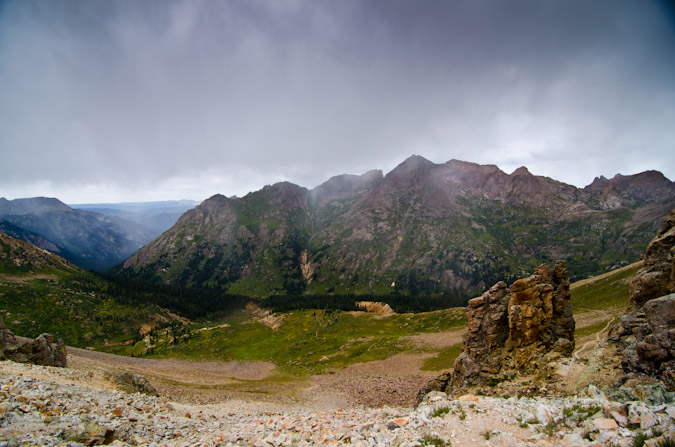
The path down from Columbine Pass was a fairly straight-forward one, following a very worn trail on somewhat steep scree and dirt.
We descended into the Basin in quick order. I had tentative plans to find a campsite closer to Columbine Pass rather than going down deep into the basin. My reasoning for this was two fold. For starters, there would certainly be less people up higher near Columbine Pass, and I prefer not to camp near a ton of people. Lastly, this would afford an easier ascent from Chicago Basin on our exit day. Indeed, we located a very clean and impacted site just into the trees and called it our home. As soon as we arrived, two mountain goats, a mom and a baby, arrived to greet us to the neighborhood.
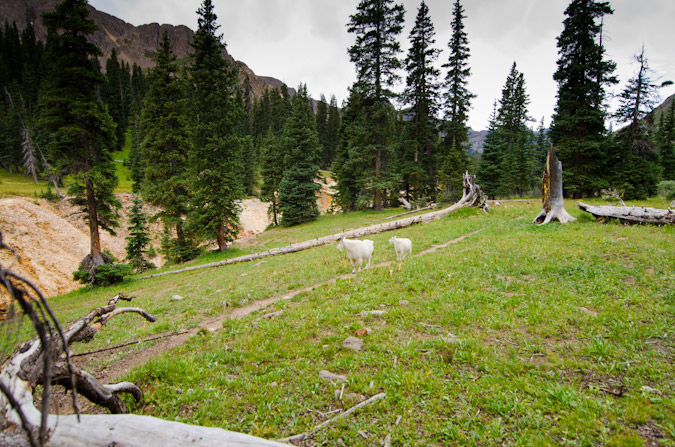
It was at this point that I knew that I did not haul my heavy 18-105mm lens in vain. I swapped lenses and took some closer shots of the goats.
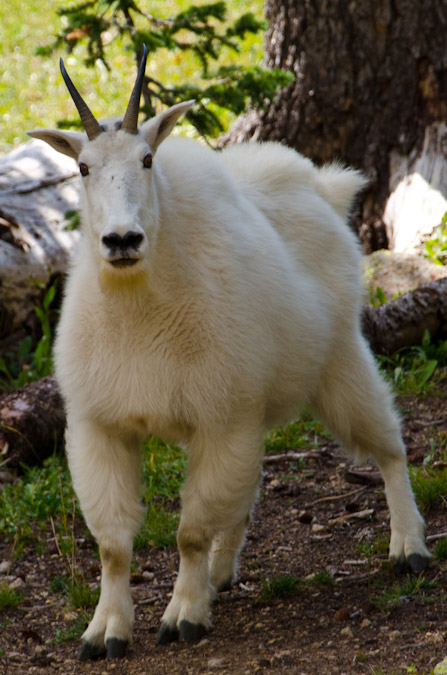
Peculiar animals - they always seemed to gravitate to difficult terrain, even in a huge meadow...
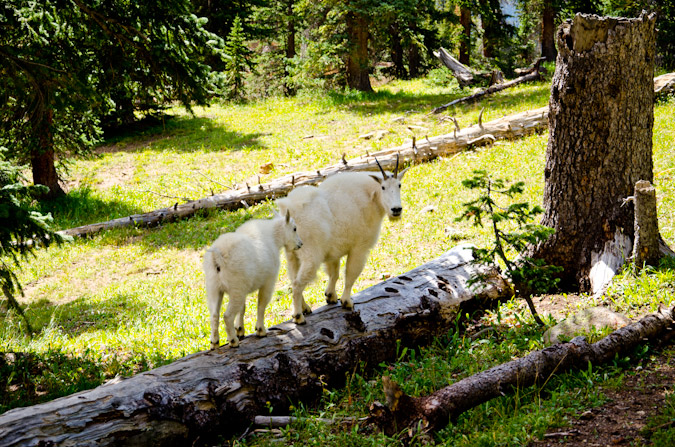
And they always seemed to leave behind some of their fur - must be their welcoming gift to us!
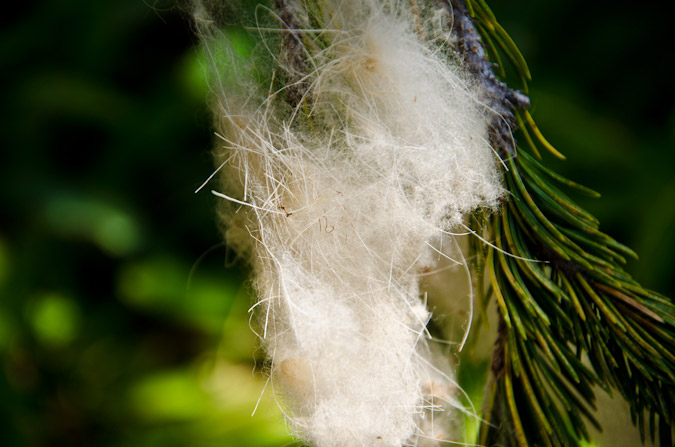
I swapped lenses again as we prepared dinner. Tonight's meal would consist of a wonderful medly of jambalaya and sausage. Hell yes.
We devoured the food and Sarah went in and took a nap. I decided to venture up the valley to see what trouble I could get into with my camera. The sun was setting and I knew it might present some fun opportunities. I found a few good spots and gave it a shot.
Here is Aztec Mountain in HDR:
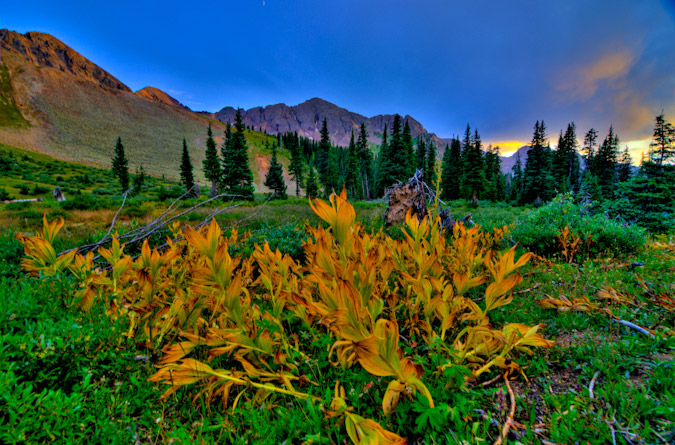
I followed the stream that entered our campsite up a ways and found a nice view of the sunset over Eolus.
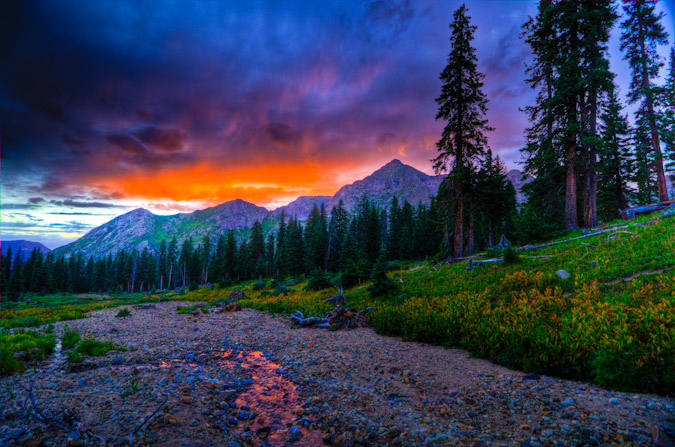
I found the water to be a fun subject to play around with.
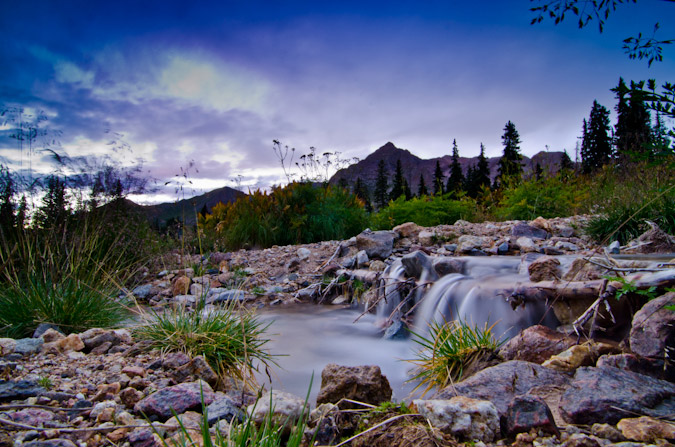
... in black and white too...
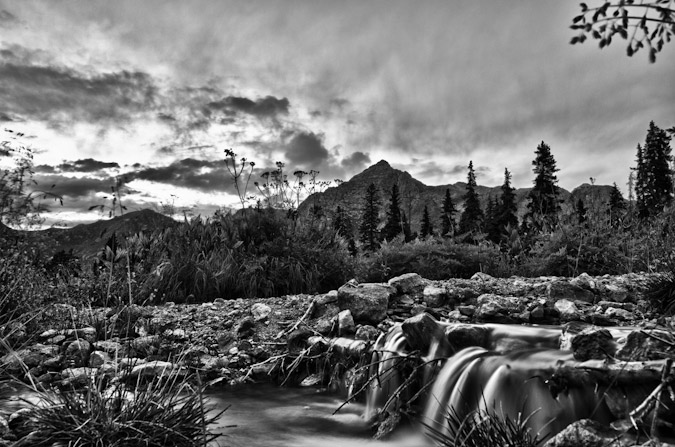
I went back to camp and found a deer was trying to eat our food, which we had not quite hung yet. I shooed the dear off and hung our food and hit the sack. We wanted to get a sunrise summit and hopefully all four 14ers, so we set the alarm for 3 AM...
Day 3: Sunrise from North Eolus, summit of Eolus and Sunlight - 5,112 ft. elevation gain, 8.7 miles.
The alarm sounded and we rose out of the tent like two zombies. Two long days of backpacking had taken its toll on our bodies. We were both sore and tired, and we knew that today was going to be huge. We also knew it would pay large dividends if we committed to going hard and strong. We raced out of camp in the darkness with our headlamps guiding the way. I knew we were looking for a sign that would point us up another trail to Twin Lakes. We dropped 500 ft. in elevation to the valley floor and crossed the fairly large drainage coming down from Twin Lakes. We ran into a solo hiker that was coming up and he said he was heading to Twin Lakes as well. I was certain we had not passed the turn-off yet, so I asked him if he passed it. He did not really know what I was talking about, nor did he know what Columbine Pass was. I was not terribly sold on his sense of direction, but decided we should follow him for a minute to see if we passed the turn-off by mistake. About 20 seconds in, I decided to look again at my map and sure enough, we had not yet reached the turn-off. I tried to signal him but his head-phones prevented him from hearing us, so we turned back and headed down further and found the turn-off within minutes. Up we went without him towards Twin Lakes. We hiked fast. Blazingly fast, considering the amount of miles and elevation we'd done the past 48 hours. We reached Twin Lakes in the dark at 5:00 AM, which felt great. We knew we needed to turn left and find the trail up to Eolus. This proved difficult, so I just went with my instincts based on what I had read. We found ourselves in the right general area below some cliffs without a trail. Through urging from Sarah, I consulted the GPS and sure enough, we were roughly 50 feet below the trail, and we found it right away. We continued up the steep trail towards Eolus and found the ramp leading up to a flat bench before the saddle between Eolus and North Eolus. The sun was just beginning to light the Earth at this point in time, and it was magical. The low light created great silhouettes of Sunlight and Windom, and the small lake below looked like a sheet of glass.
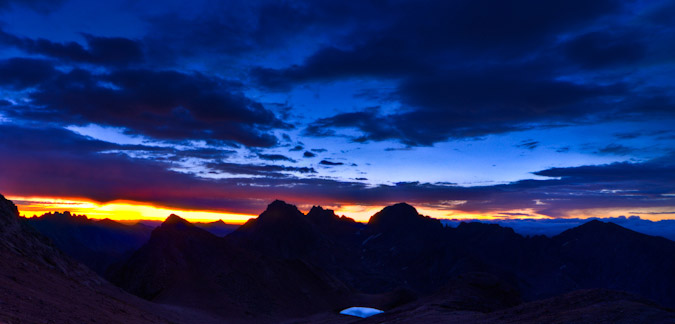
We continued up towards the saddle and found another herd of goats coming down from above. The baby goats were making an adorable high-pitch sound that could only be encapsulated thusly, "eeeeeeeeeeeeeeeeeeeeeeeeeeeee!"
It was truly a gift to be able to witness these creatures in their true habitat. I know that Chicago Basin trip reports are oft too full of tales of mountain goats, but in this case, I really felt like I witnessed something special, watching these beasts navigate this rugged terrain. I coined a geeky phrase while watching them, which I shared with Sarah - "Wanting to Buy - Mountain Goat skills."
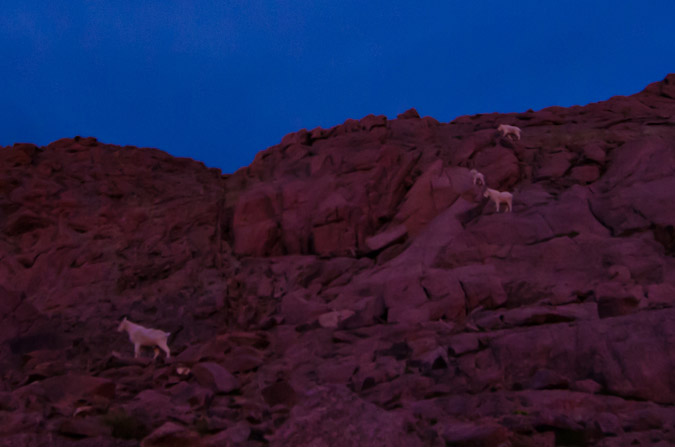
Pushed by the imminent sunrise, we climbed on, and reached the Eolus - North Eolus saddle. The famous Mount Eolus catwalk and Mount Eolus were looking mighty fine in the early light.
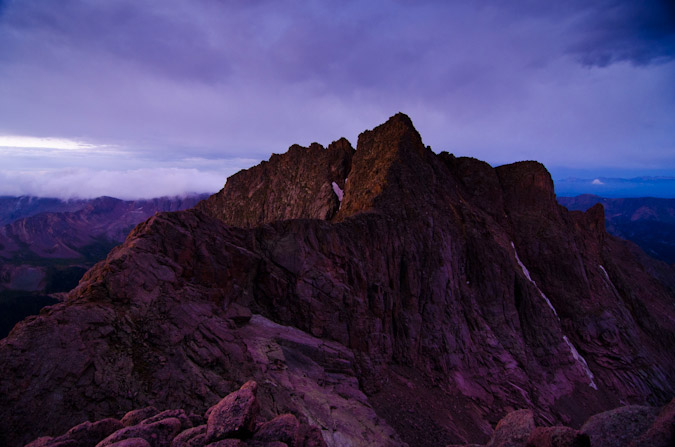
Looking up at North Eolus, I knew it would be an incredible vantage point for sunrise, and so we went for it. In true form, we reached the summit just moments before sunrise. I was jubilant and ecstatic, like a kid on Christmas, and I captured some footage on video:
For all of you detractors of HDR photography out there - I decided to showcase both methods (HDR and non-HDR) for this trip report, to please everyone and to demonstrate the difference. You can mouseover / click to see the other version. Here is what greeted us at the summit (mouseover / click to see the non-HDR version).
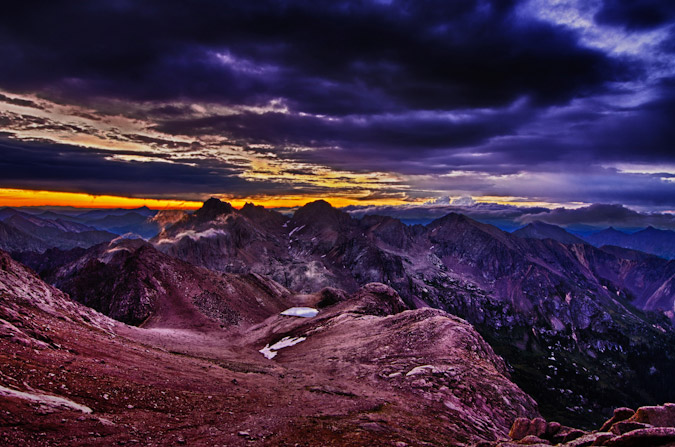
Slowly but surely, the sun began to poke through the clouds, which were the most insane feature of the scene - absolutely magically dramatic.
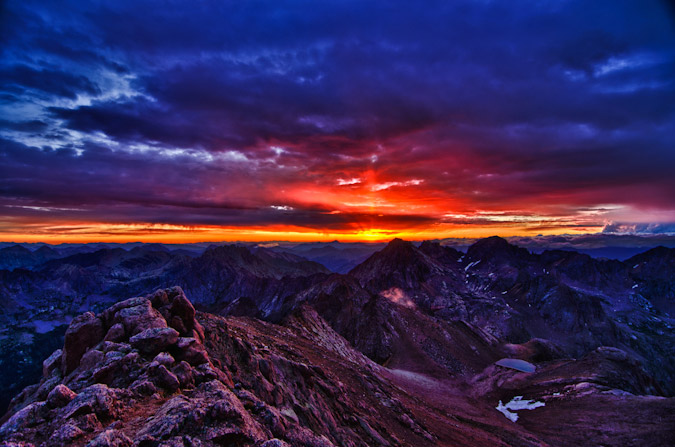
This next shot is non-HDR, and one of my favorites from the entire summer.

I was in heaven (probably quite literally). The views of Pigeon, Turret, Monitor, Animas, Arrow, Vestal, Sunlight, Windom and even Rio Grande Pyramid were stunning. Breathtaking. Here's a near-360o panoramic. Click to see a larger version.
The HDR Panoramic version turned out pretty well too, although in this case, I almost prefer the non-HDR version, except for the fact that the clouds look INSANE in HDR (click for a higher resolution version).
I have about 20 versions of these panoramics that I can't set my mind on picking a favorite, so I decided so share a few more...


As we were both getting pretty chilly, we decided to get a quick group photo and head out. Click / Mouseover to see non-HDR version.
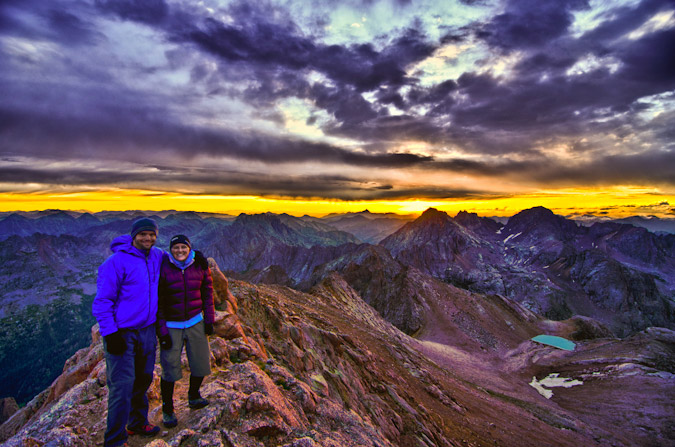
We found ourselves back at the catwalk, which was impressive. Sarah and I immediately began reciting the classic Right Said Fred 1992 song, "I'm Too Sexy."
Once we reached the catwalk, I could not help but sing, "I shake my little toosh on the catwalk" and do a little wiggle. After revisiting that video, I can't help but feel a little light in the feet if you know what I mean...
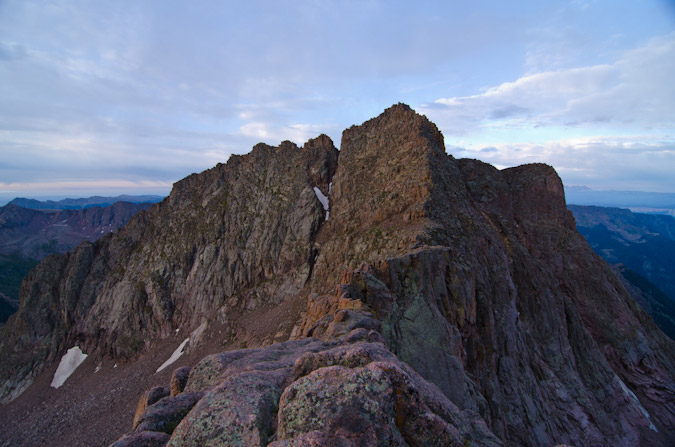
Sarah was kind of nervous for the catwalk, but her smile said otherwise.
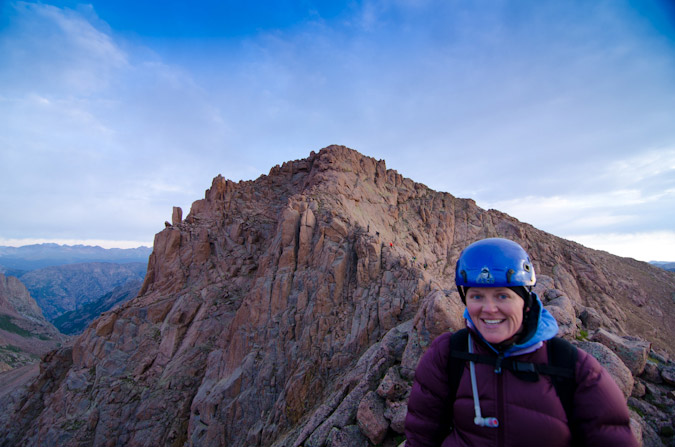
Once past the catwalk, we were greeted by some really fun and intricate ledges on the face of Eolus. I had read some about them, but nothing is quite like being there. It kind of reminded me of the final sections of Crestone Peak, only a ton more of it.
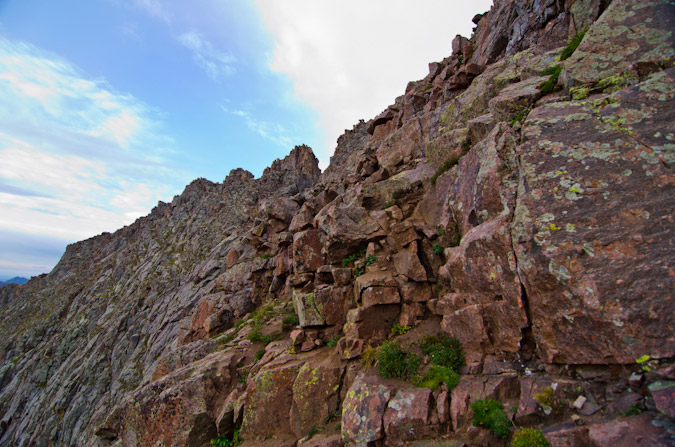
One thing was blantantly clear - a mis-step and you would be tumbling to your death. In a moment's notice, the sky became filled with small snow-flakes, adding to the magic of the morning.
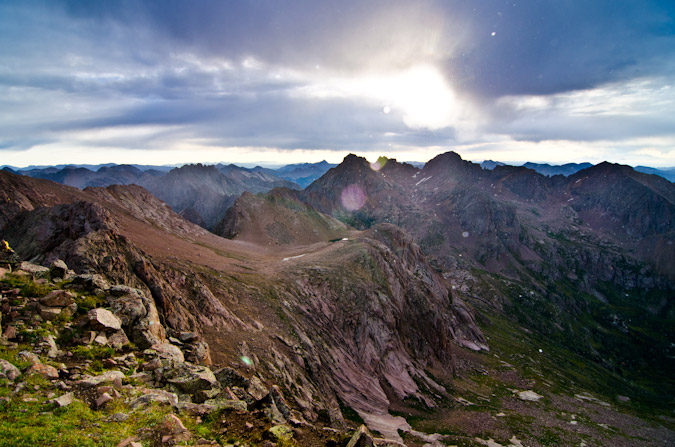
At 7:40 AM, we reached the top of Mount Eolus and it was a great feeling. We felt like we had accomplished so much this trip.
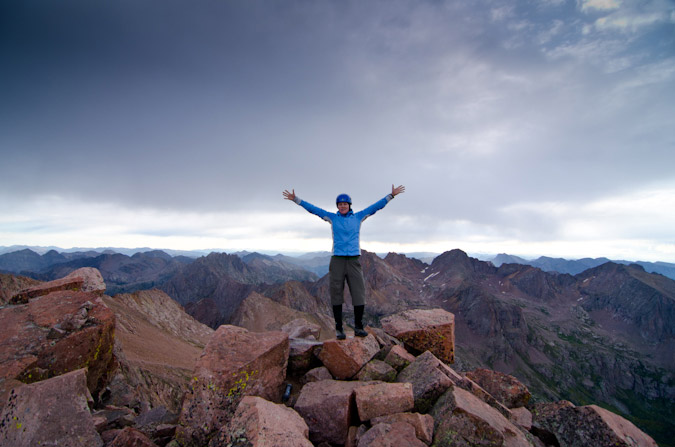
It was so awesome to see Arrow and Vestal again after my trip up them last year. Soon after we summited, a solo hiker joined us on top. I mentioned how awesome Arrow and Vestal looked and he asked me what they were. It made me very sad. My reply in my head: "Only the two coolest mountains in Colorado!" He said I was wierd for climbing 13ers before 14ers... sigh. They are seen just left of me in my summit photo.
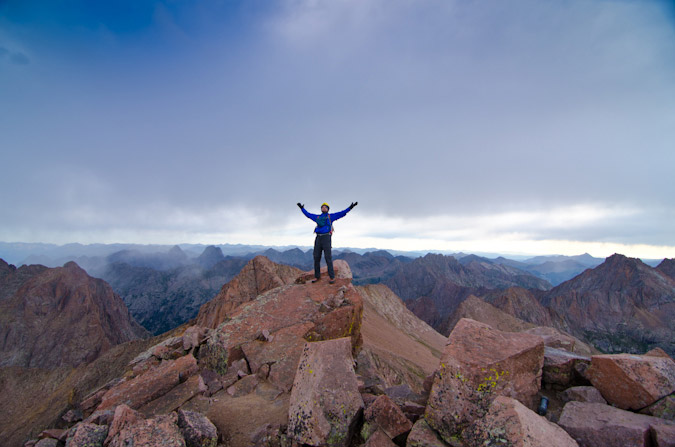
The views looking down the valley we had just came up were so awesome. In the dark, you can't fully appreciate the scale of your hike, but once above, it becomes really clear that what you accomplished was huge.
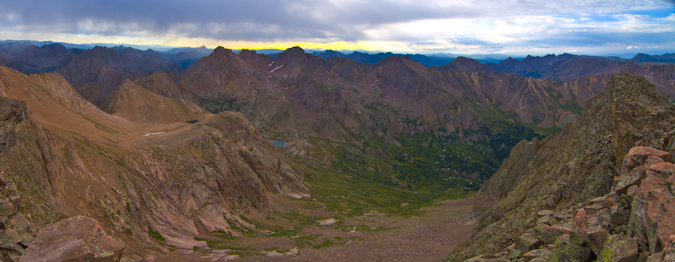
After spending about 10 minutes on top, we decided to head down, knowing we still had more mountains to climb before the weather got really bad. The clouds seemed to be holding in our area, but looked crazy in other areas. Time would be of the essence if we were to get all three in one day. On the way down, we passed one older guy with huge calves that provided the absolute best opportunity for laughter for Sarah and I. I should not jest, but when you're tired, almost everything is funny. He was wearing almost no gear, super old-school boots, no helmet... and socks on his hands for gloves - yep. Also on the way down, we saw a large group closely together, coming up. I was almost certain that it was either a guided trip or some sort of vacation group. As we passed them, they were indeed somewhat odd, but very enthusiastic to be up there nonetheless, and that's what matters! They were coming quite slowly and when we passed them, they were studying maps and routes and 14ers.com printouts. They also appeared to be wearing helmets that were fit for people twice their size. At least they had helmets. You can see them as small dots in the photo below.
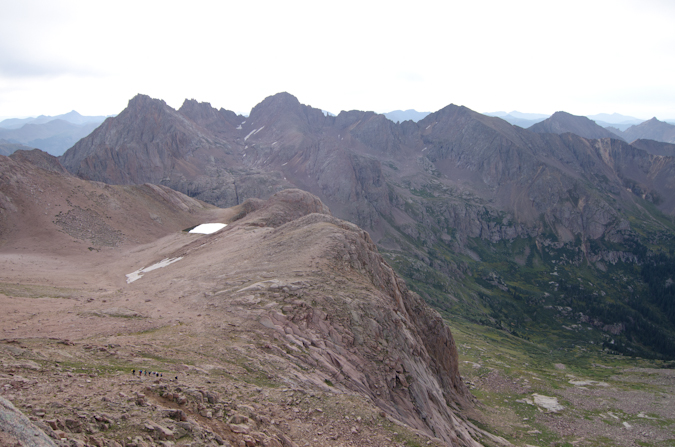
The way down was fast. Too fast. I felt like I was at cruising speed. My legs felt great, like adamantium.
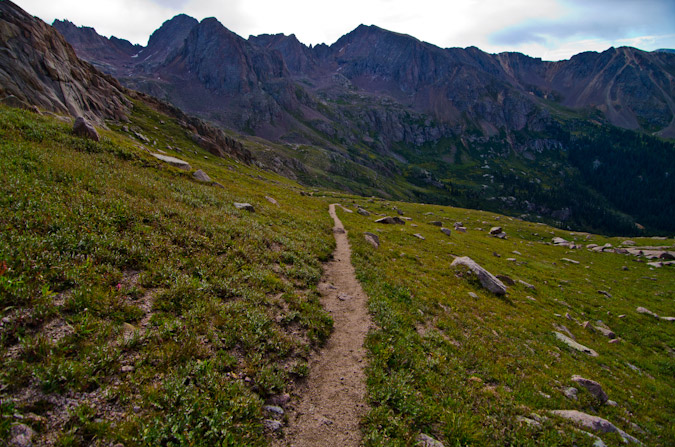
Naturally, we passed a solo goat on the way down. Those guys were everywhere!
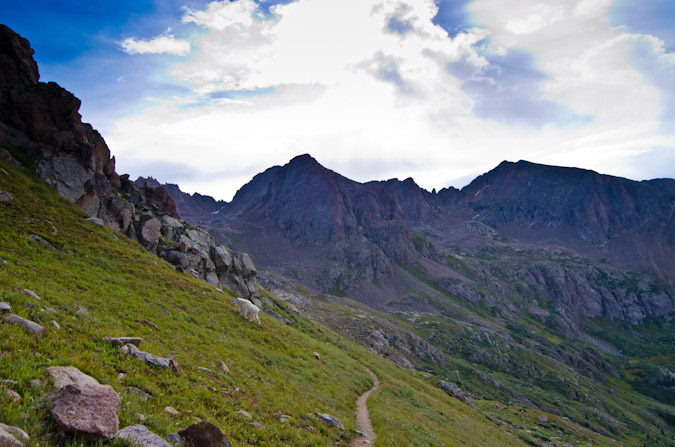
We rounded the corner and the Twin Lakes came into view, including Needle Ridge, Sunlight and Windom. Spectacular!
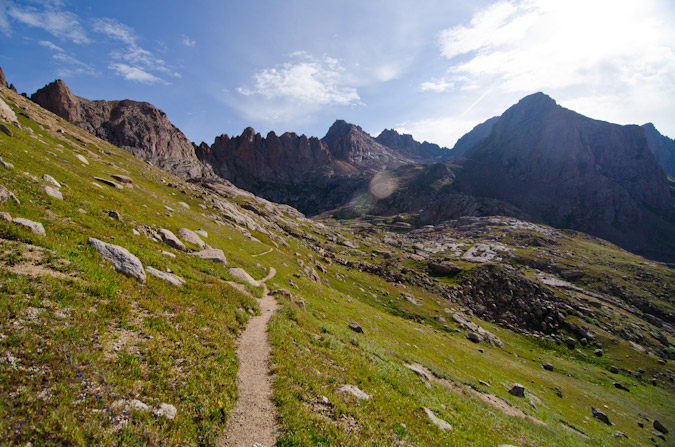
I raced down to the lakes, knowing it was just going to be a feast for my eyes and camera. Right as we reached the lake, a friend of mine, Will, who joined me for my hike of Mt. Wilson last month, met up with us. He was gracious enough to refill my Camelbak bladder with purified water. He was planning to head up Eolus, as he had done Sunlight and Windom the day before. I set-up my tripod at the lake and started shooting photos. Will captured the moment.
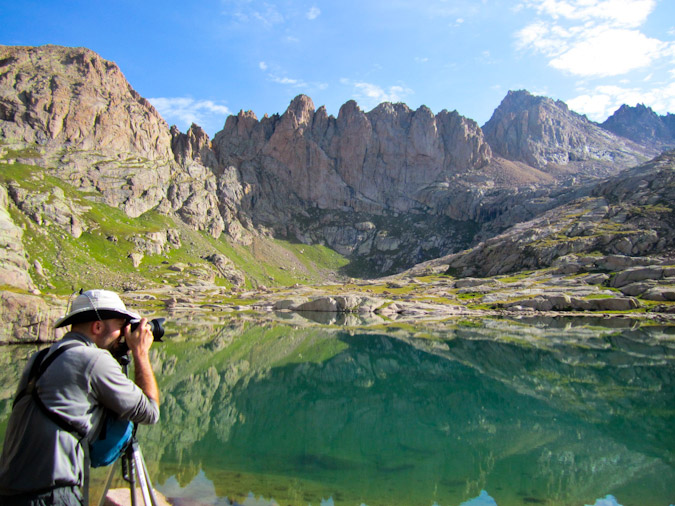
For this particular scene, I decided to do HDR since the sun was in the scene, which made it really tough to get all of the dynamic light into the shot. I would be the first to agree that this shot is totally over the top, but I love it just the same.
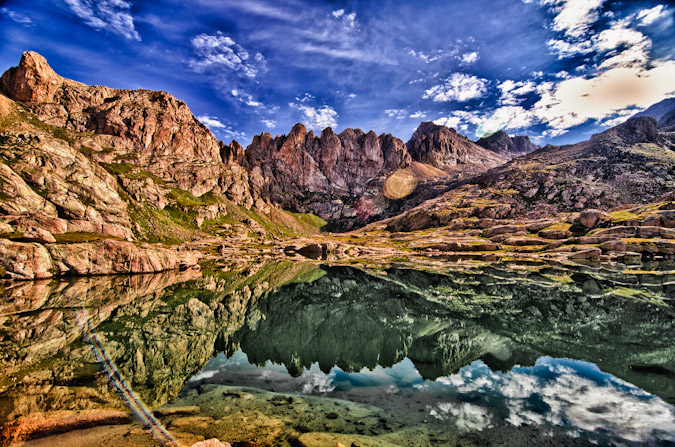
I also decided to get a shot of me at the lake, using the tripod and the self-timer.
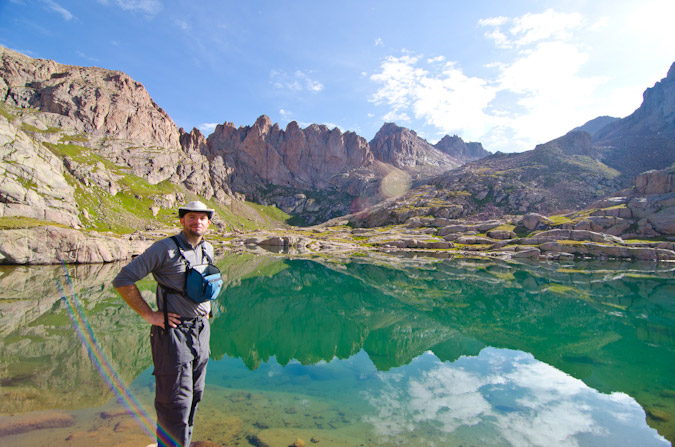
Sarah and I refueled by eating some awesome tortillas w/ peanut butter and honey we had made the night before and then set-off for Sunlight. The trail up Sunlight was so awesome. The incredible work of the Colorado 14ers Initiative was obvious here. Huge cairns marked the way. Stone-work that would make a dwarf from Lord of the Rings envious demarcated the trail, paving a highway up the slope of the mountain.
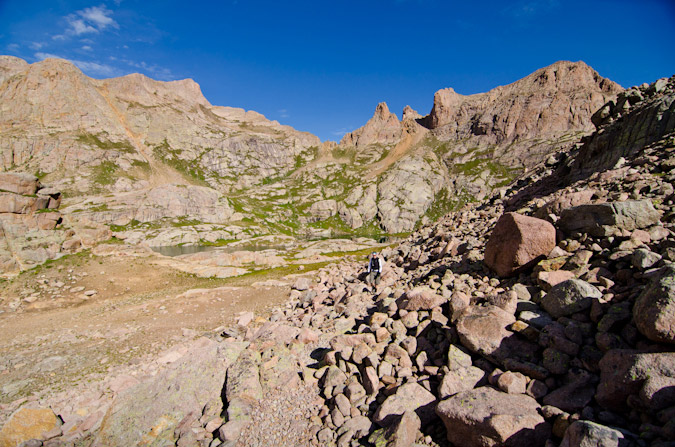
As we climbed, the Twin Lakes were looking as awesome as ever.
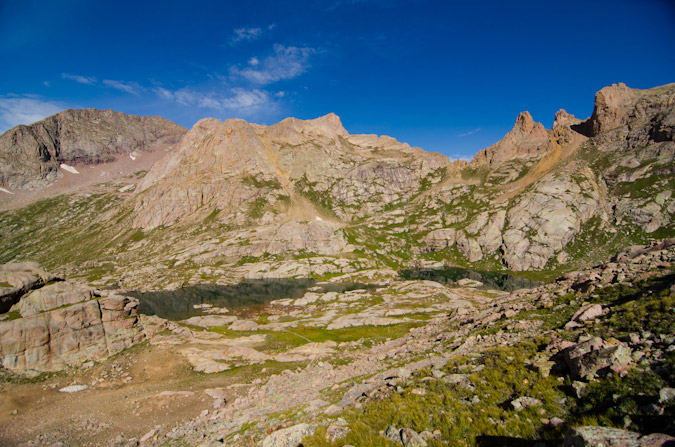
And the cairns were monsterous. Looking back at Eolus was also humbling.
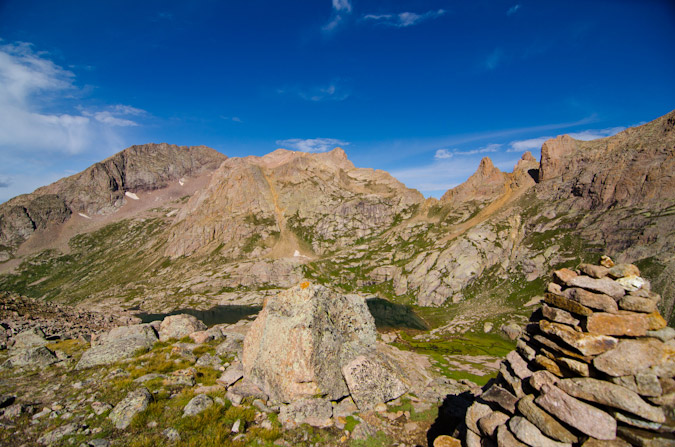
Looking up, we still had a ways to go to reach the Sunlight Peak - Sunlight Spire saddle (top - center).
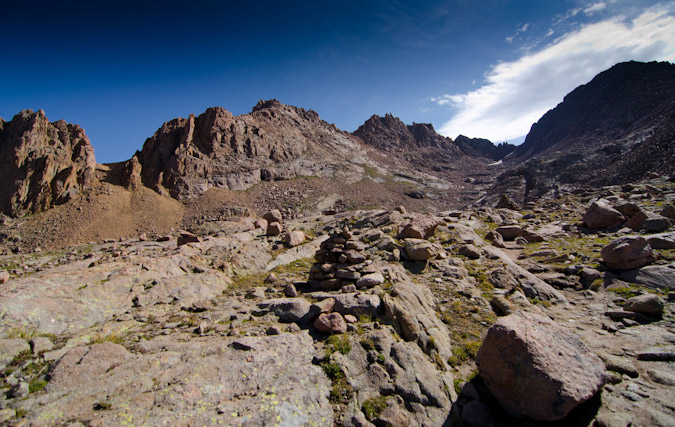
The cairns also provided some good resting areas.
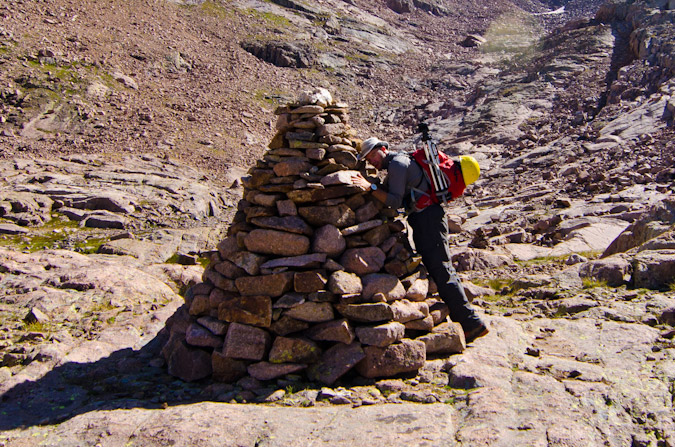
We reached the top of the basin and started climbing up towards Sunlight.
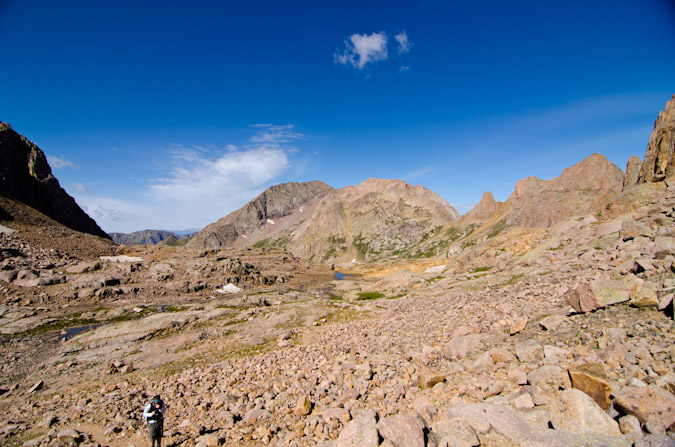
Which became steeper the higher we got, and eventually the paved road provided by CFI ended, and scree began.
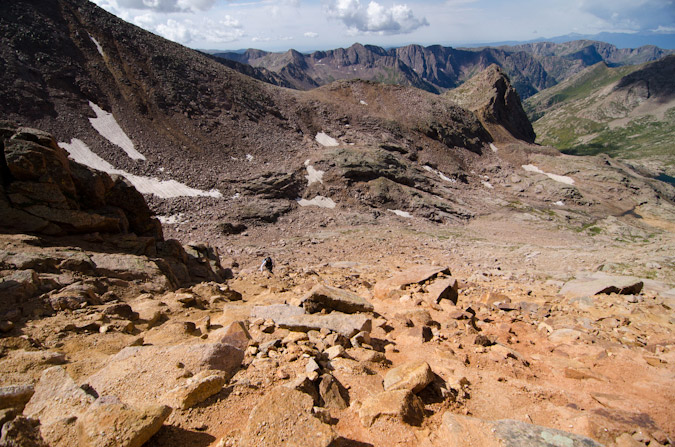
I reached the saddle and admired the views to the north of Jagged Peak, which is one of the last few mountains in the highest 100 I have left to climb.
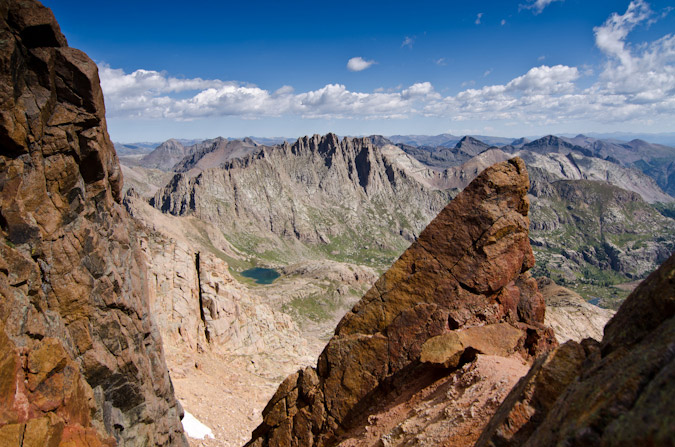
Sunlight was still high above from the saddle, as evidenced by this 360 panoramic photo with Sunlight at center.

At this point, Sarah was feeling light-headed. I knew her stamina was OK but something was going on with her body. I suggested that perhaps she needed more protein, since we had not had much through the day. I pulled out the huge log of summer sausage and we snacked for a bit. Sure enough, within minutes, she felt much better and we were off to the races again. A view back at Windom and the clouds forming above provided motivation.
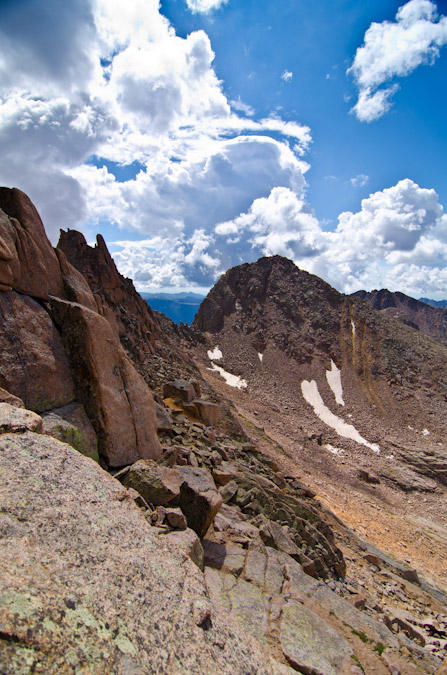
We reached a small gap during the climb, which was quite challenging to say the least, and I loved the window. The views of Rio Grande Pyramid and "The Window" were great! So this photo is called - "The Window through the Window."
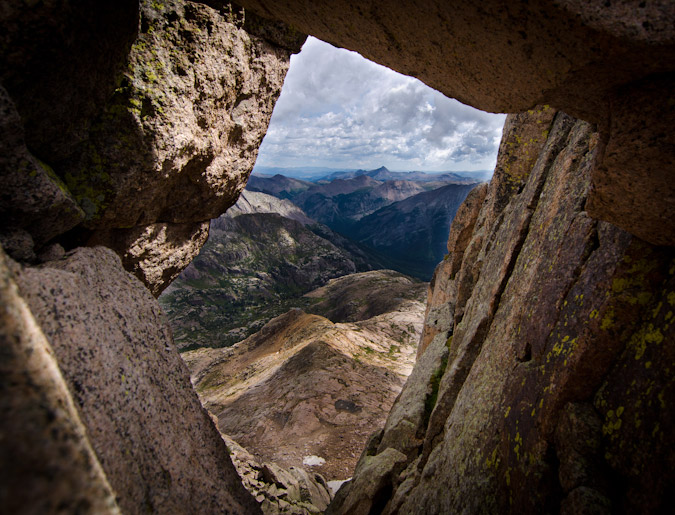
We found ourselves actually using some climbing skills - and head up a small chimney.
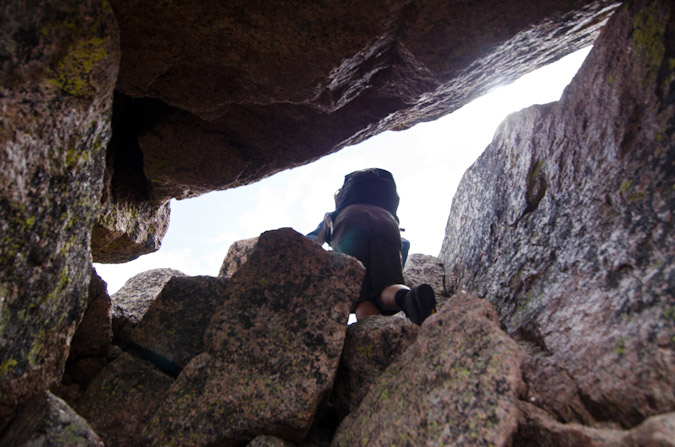
We reached the summit of Sunlight Peak at 11:45 AM, which felt pretty great considering we had been on Mount Eolus just 4 hours prior. The weather was moving in though, and that dampened our spirits. An exciting climb like this should feel amazing when you get to the top, but the thought of being electricuted tends to temper those feelings for a while. I managed to get a few panoramics anyways, which show how nasty the storm moving in looked.

Here's a near 360 pano:

And a quick summit photo by way of Sarah, including Sunlight Spire's incredible summit just left of my camera bag:
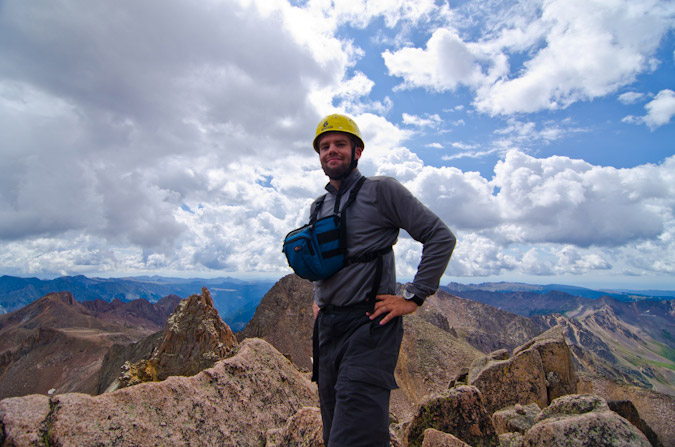
The air filled with graupel, a sign that things were not going to be good - weather-wise. We reached the Sunlight Peak - Sunlight Spire saddle in quick order, passing several people still heading up. Not sure if that is the best idea to head up when the storm is depositing ice on the rocks, but that's just me. Here's my reaction to that!
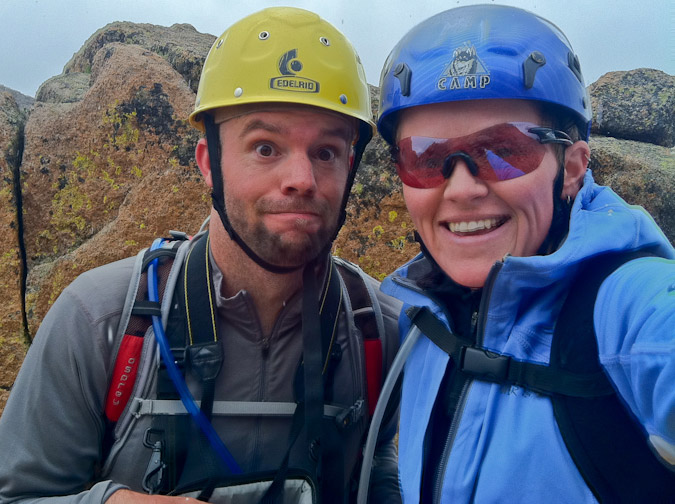
Here comes the weather!
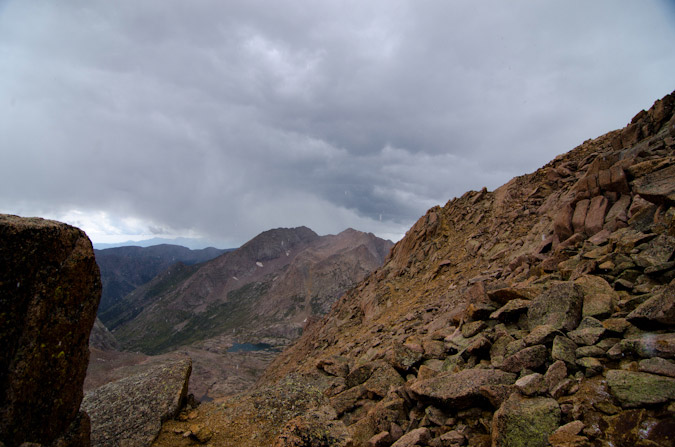
The crazy kids in tennis shoes and cotton hoodies kept going up through the graupel and thunder, but we booked it down to safety and took refuge.
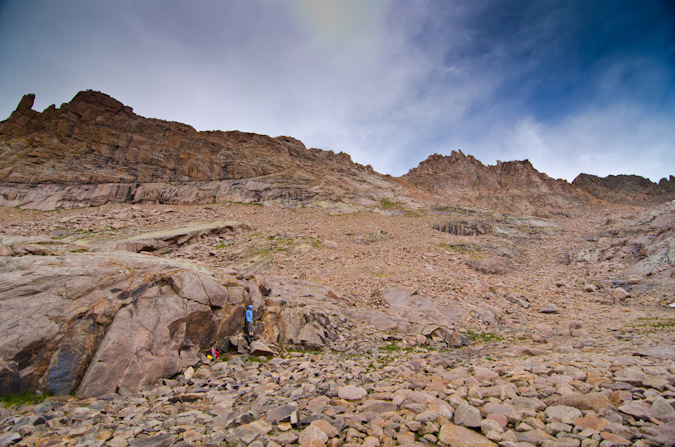
Luckily for our friends in cotton and tennis shoes, the weather let up, dumping only light amounts of rain in the area. The rocks were slick though, and that was a real concern to us, even though Windom was just 1,100 feet up from our safety spot. We sat for awhile, watching the weather, contemplating our next moves. Would we be able to wait out the storm? Would it be safe to go up? We sure did not like the thought up coming up again in the morning on tired legs. We finally agreed that it made the most sense to head down, especially given the fact that it was still slightly raining and the rocks were getting wet and it was still sounding off with thunder. Even on the way down, I stepped on a large wet rock slab that was slightly at an angle and it dropped me on my side like a hit from a middle linebacker. I was fine but it was a good reminder that we had made the right choice to go down. Even still, more and more people kept heading up. Madness.
The views on the way down were still great though, including this wonderful shot of some waterfalls below Twin Lakes.
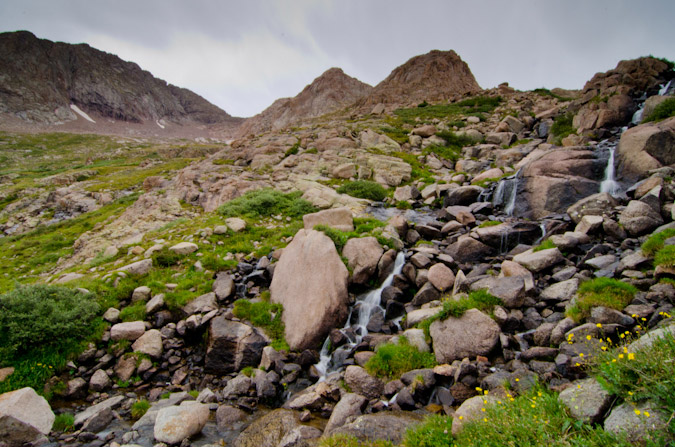
The weather persisted most of the way down into Chicago Basin.
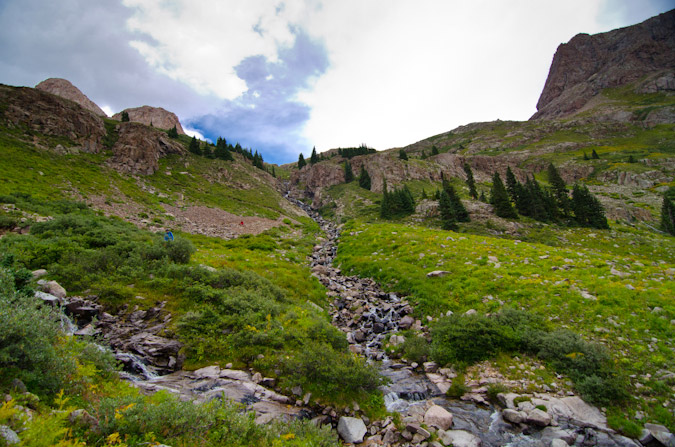
And in true San Juan Mountain form, the weather started to dissipate as we got lower...
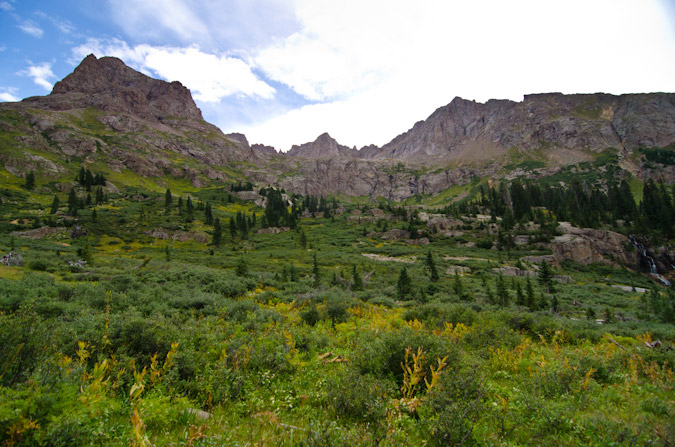
We reached our campsite slightly demoralized, tired, and sore. My knee was starting to really hurt from all of the pounding it had received on the downclimbs, which did not bode well for the climb up and down Windom for the following day. Such is life on a quest for mountain tops. Sarah decided to take a nap and sulk over our defeat, while I decided to eat some food and think about the day's highs and lows and the strategy for the following days. As we were moping, a herd of goats decided to come see what all the whining was about and one of them even decided to piss on our pity parade.
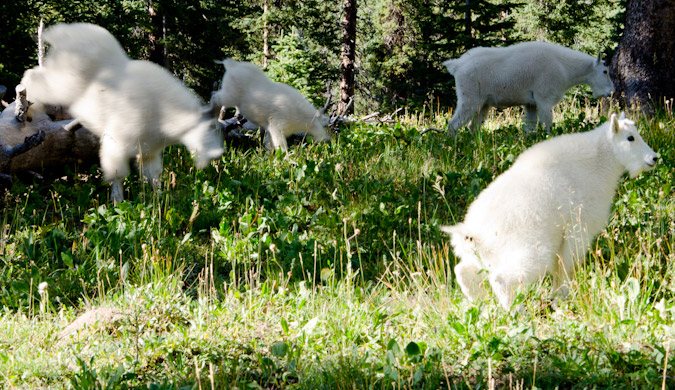
This herd was pretty big - I believe there were 7 of them total, including two babies, a real scruffly looking one, and a bigger grandpa type.
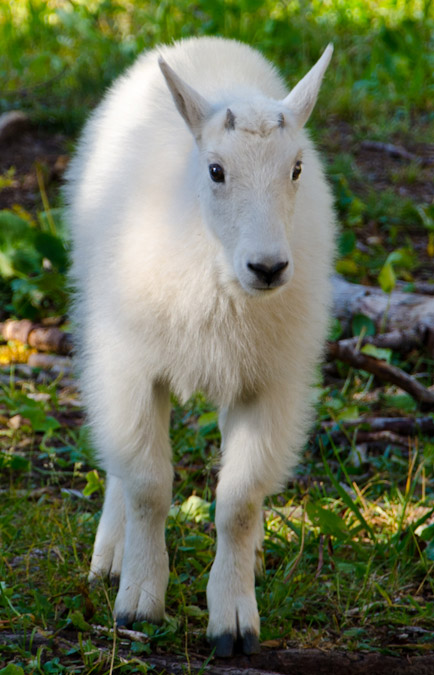
Here's Mr. Scruffly:
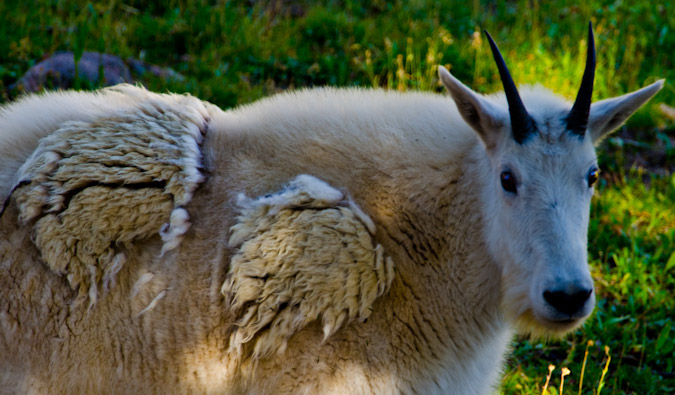
And my favorite goat photo... I was photographing them from near a fallen tree when all the sudden this baby goat decided to jump on the tree and walk towards me - he came all the way down and started nibbling on the tree - it was really cool.
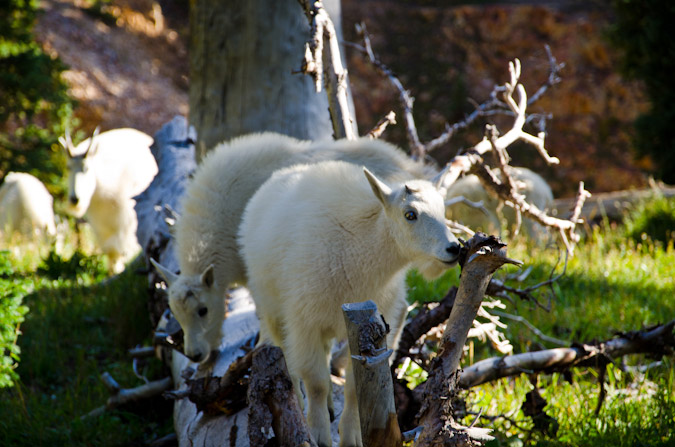
One of them kept a good eye on me. I think he was making sure I was not going to attack them or something. It was funny to watch them interact so closely. Sometimes the babies would go under a female for milk and they would get shoed off. Sometimes one goat would kick another goat out of a grazing spot in a fury. They were hilarious.
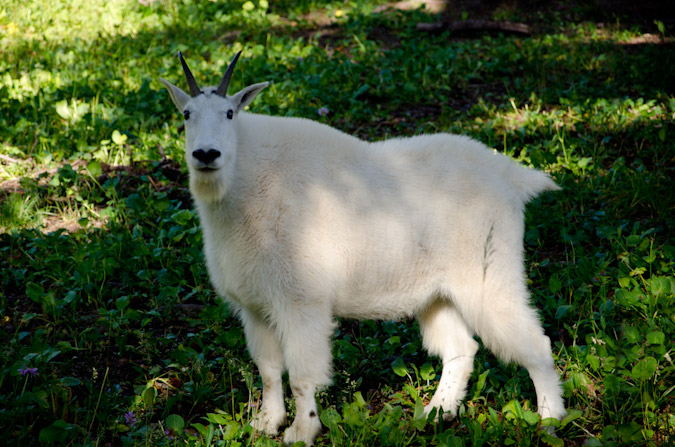
I probably got too excited about the goats, but I've been waiting years to see goats up close again, so it was a real treat.
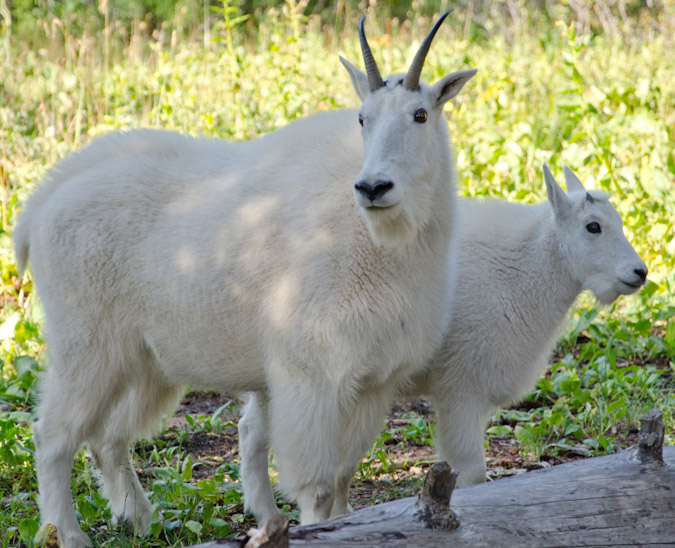
It was really funny how close they got to our campsite! One time, one of them charged another one, and did not see that Sarah was right behind the other goat. When he turned to run, he almost jumped right into Sarah!
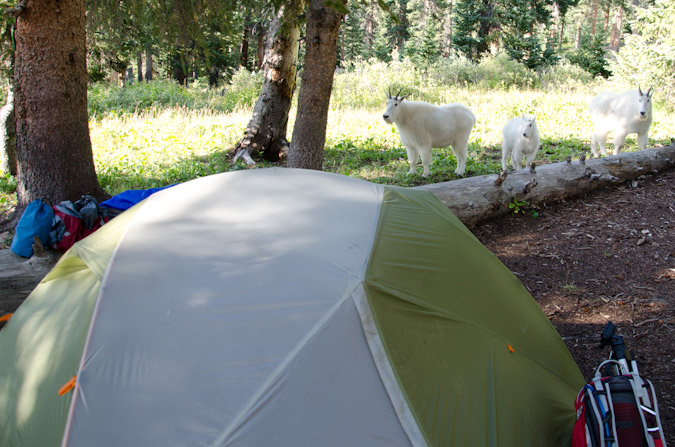
They were really fun to photograph.
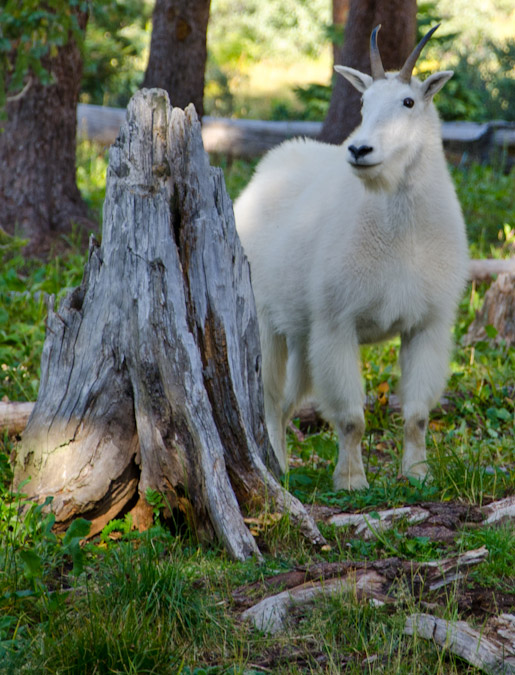
This little guy was playing king of the hill. I think he ended up losing.
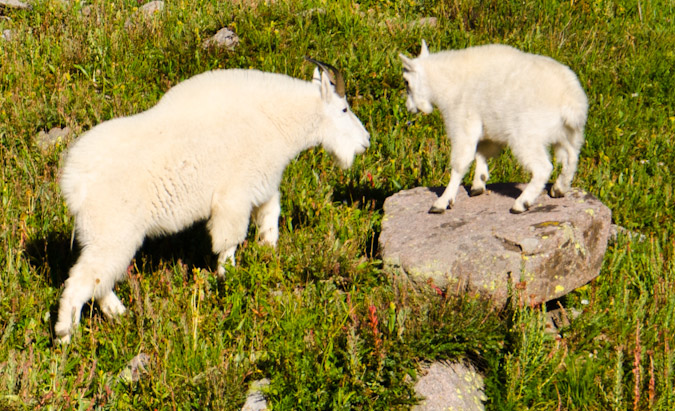
I did some video footage of the goats as well -
After the goats were dispursed from our campsite, we cooked dinner. Our dinner consisted of a glorious mixture of mashed potatoes, country gravy and spam - a tried and true recipe from the annals of the backpacking hall of fame. The alarm was set for 3:30 AM and we crashed hard into the gelatinous wall of sleep that always greets you after a hard day of mountain climbing.
Day 4: Climb of Windom Peak and pack-out - 19 miles, 6,500 ft. elevation gain - 20 hours of hiking...
3:30 AM came all too soon, and I hit snooze twice. So, we did not leave camp until 4:15 AM. The going was slower and we were feeling pain. In fact, I was quickly questioning my physical capability to complete the climb, and we had not even reached Twin Lakes. Halfway up Twin Lakes, I had to stop and take some vitamin-I (Ibuprofen), as the pain my knee was excruciating. The pain quickly faded and we reached the lakes in the darkness of the early morning.
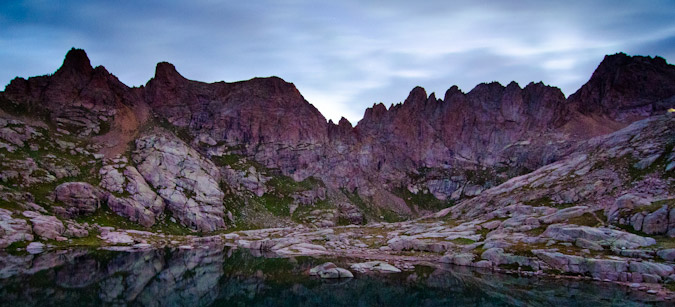
Hiking up to the Windom side of the basin was accomplished in short order, and the stellar light of sunrise kissed the mountains around us.

We reached the saddle between Peak 18 and Windom pretty quickly. On the hike down from Eolus, one of the climbers in the cluster of oddly-equipped people told us that Windom was underestimated. We were not quite sure what the heck he meant by that, considering so far both Eolus and Sunlight were both more difficult. There was a trail 3/4 of the way up Windom. We finally did find out what he meant, since the trail gave way to some very fun scrambling on class 3 rock if you wanted it. Many inappropriate jokes were exchanged between Sarah and I regarding the 'underestimation' of Windom and we were off to the races. We both agreed that had we done this climb while wet, it would have been quite dangerous. The views of Sunlight Spire and Sunlight were great. Loved it. Here you can see sun light just hitting Sunlight Spire with Windom's steep class 3 rock on the right.
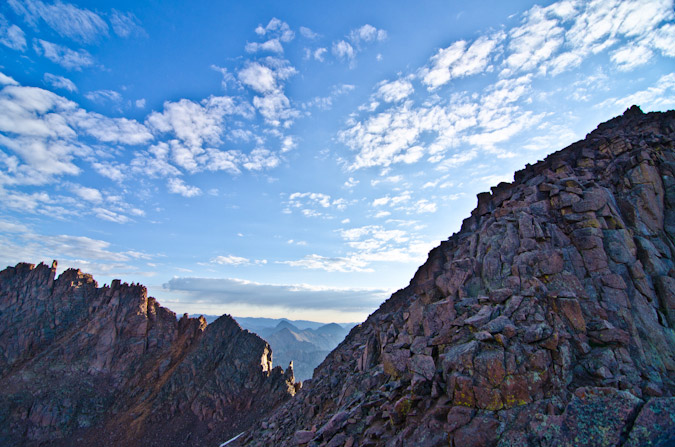
We reached the summit block and the views to the east were insane. The sun had been shrouded by some odd clouds, and light beamed forth like needles cutting through a gray sheet in front of car headlights. Unnamed lake at 13,100 ft. to the east was also a real treat - a sheet of glass suspended in heaven.
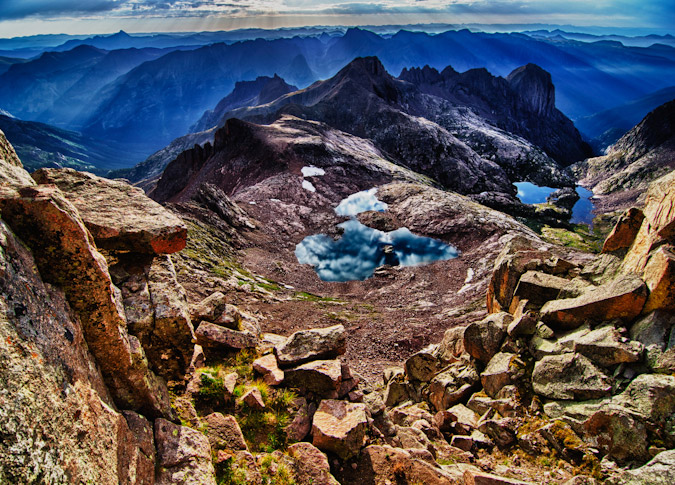
I reached the summit first and just felt complete and total gratification for our efforts. After the demoralizing defeat the day before, this summit was delicious.
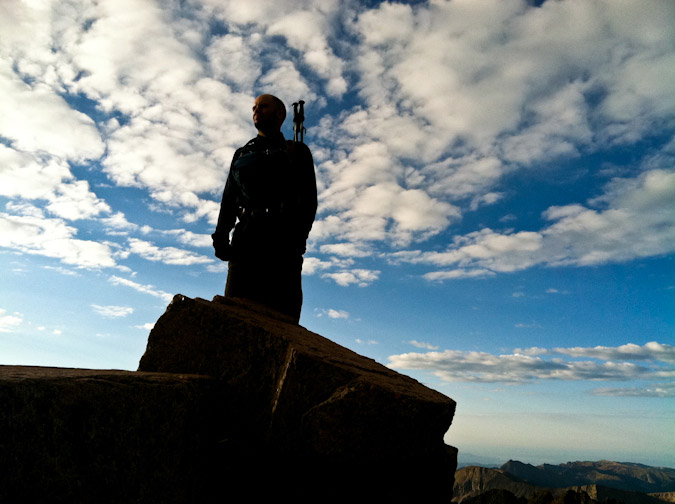
The summit of Windom was curious. It was a series of huge blocks, all seemingly suspended by some unknown force.
It was hard to believe that I had finally made it to Windom's summit. I had first admired this summit back in 2001, when I climbed Jupiter in a cotton t-shirt with my dad. Wow, have I come a long way! Check out that summit shot from 2001!
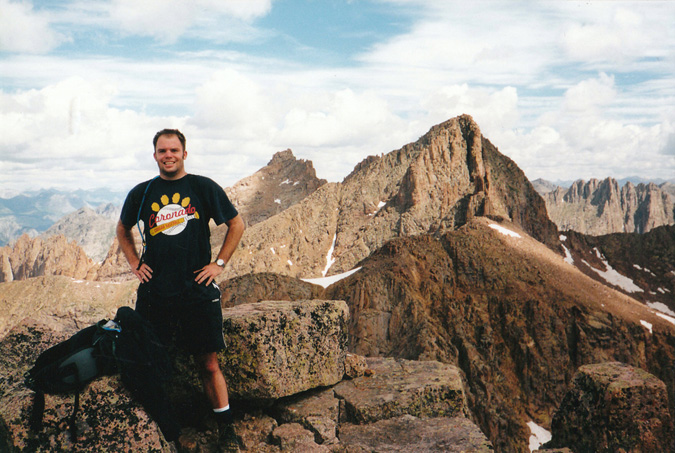
Due to the absolute absurd (meaning awesome) lighting, the opportunity for HDR photography was endless. I opted to just go for it. Sarah was pleased with this summit as well. It was totally under-rated - great challenge, great route and great views.
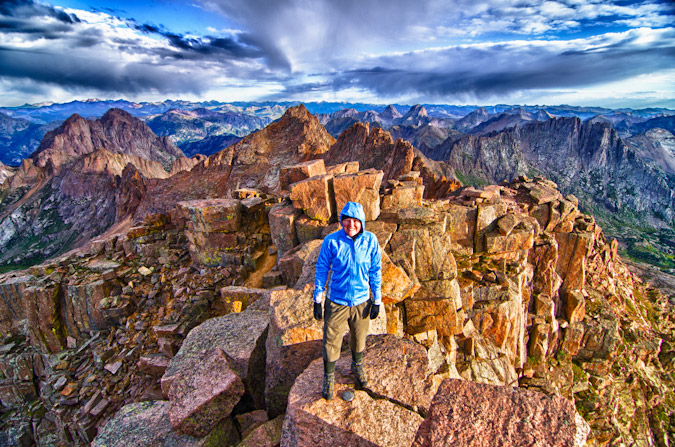
Sarah snapped off three bracketed photos of me on Windom's summit block - and the HDR result was WAY over-the-top, but epic looking either way.
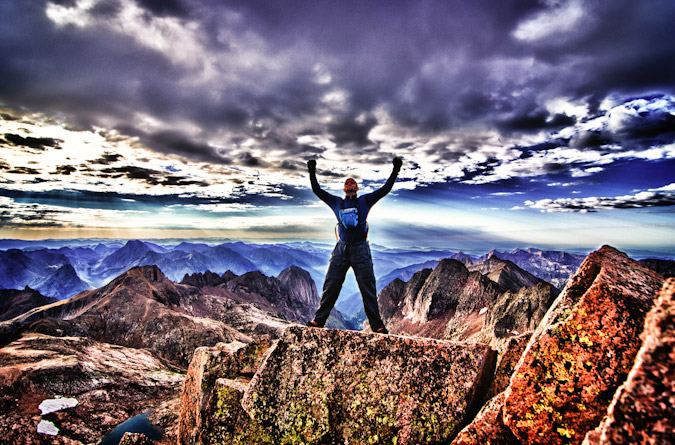
At this point I did some pano work and went for the classic 360 HDR pano. I fell in total love with the results. The way the light just penetrates the low clouds just floored me. The details on Sunlight and Sunlight Spire were magnificent. Thank you Tokina 11-16! Check out the larger verison by clicking on it.
Windom provided such a great view of Arrow and Vestal too...
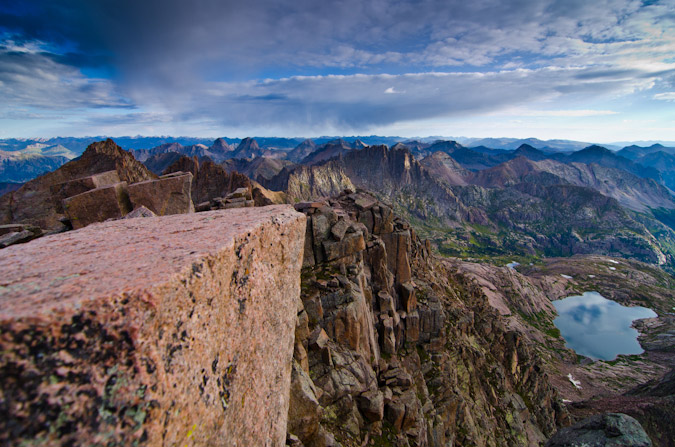
We headed down and enjoyed the views of Eolus all the way down.

Before we knew it, we had already reached the trail junction for Columbine Pass and headed back to camp. We passed an old mine again but this time stopped to take pictures. Another group had mentioned that the mine was actually pretty cool to explore, but that was not high on our list.
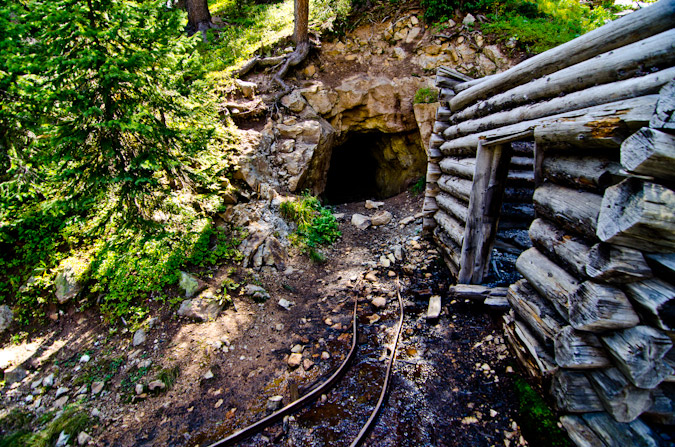
We reached camp at about 11:15 AM and packed up. We set our minds to the idea of getting all the way back to the car today. It was a lofty goal, to be sure, but we felt like we could do it, plus for some reason my legs decided that they were no longer sore. So we departed at 12:00 PM, with rain gear at the ready, and minds determined. Hell or high water, we were going to make it to the car. The climb out of the basin to Columbine Pass was gruelling. It was painful and slow. The weight of our packs and the fatigue of the weekend's work had us moving a consistent snails pace. We reached Columbine Pass and looked back - it felt great to get this far already, but we knew that the day had just begun...
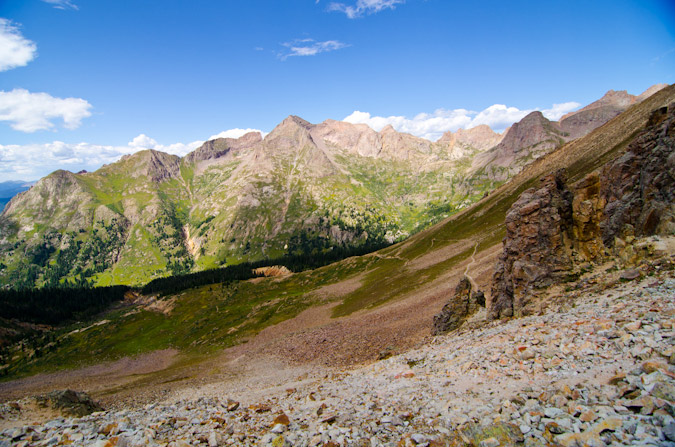
A look over the other side of the pass revealed clear weather and an inviting Columbine Lake. Trimble Pass - here we come! I turned on a podcast of Mike and Tom Eat Snacks - which had me in stitches for most of the hike up to Trimble Pass. Sarah was comforted by the idea that she was hiking with a madman.
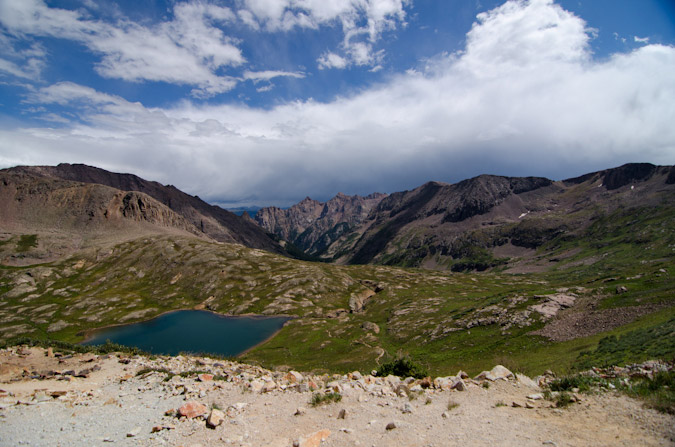
The journey from Columbine Pass to Trimble Pass was pleasant, albeit slow and methodical.
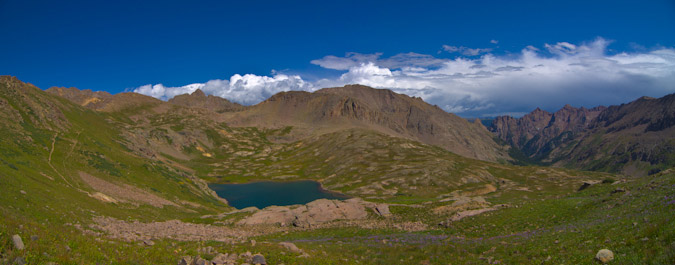
We reached Trimble Pass at 3:30 PM. We were still tired and sore, and required some time to rest, but we soldiered on.
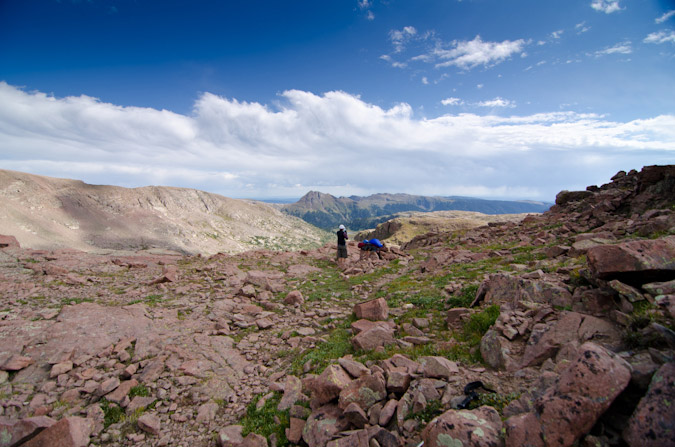
As we downclimbed from Trimble Pass onto Silver Mesa, I took one final parting shot of Chicago Basin... what a great place!
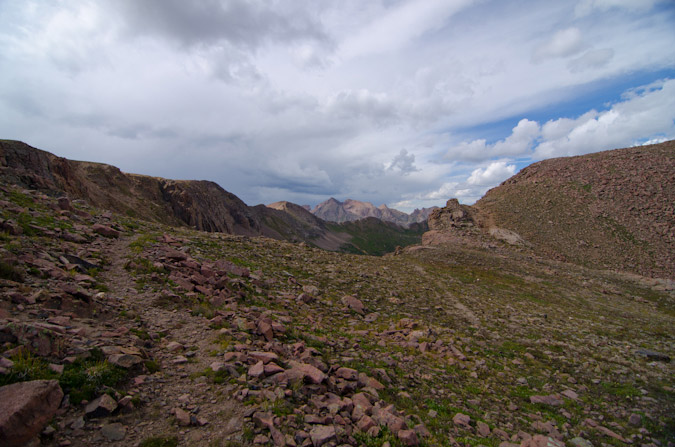
As we marched across Silver Mesa to the beat of our own music or podcast, we could not help but notice a huge storm brewing to the west. It looked as though it was moving our direction, so we kept eyes on it constantly. It was quite a sight either way.
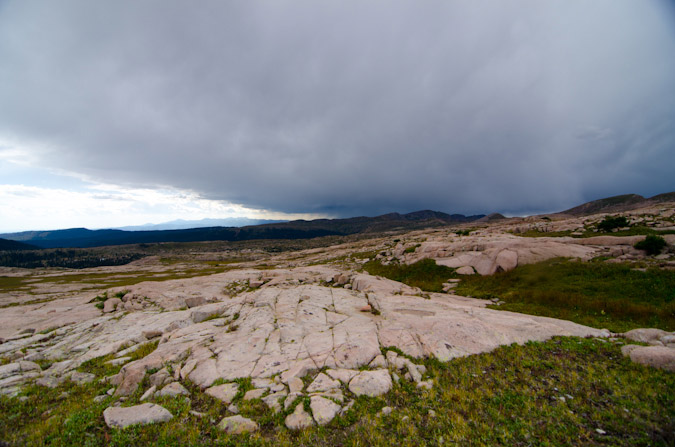
Silver Mesa had so many inviting campsites that tempted us. We kept going.
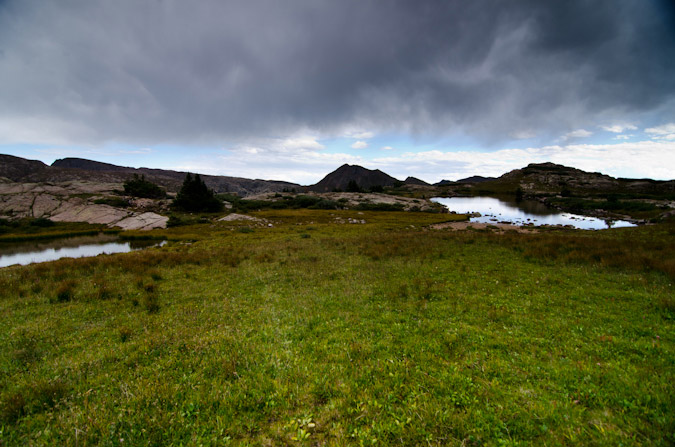
Before we knew it, we were at Lake Marie again. Just below Lake Marie we stumbled across a man from Boulder with four llamas. He was looking for Lake Marie. He had been up the trail and did not see it. I showed him where he was on the map. He thanked me. We were puzzled how one can miss a giant lake, but did not question it a whole lot, as we were focused on a mission. A mission of muscle-pounding and soul-crunching. We reached City Reservoir. It was also teasing us with its ample camping potential...
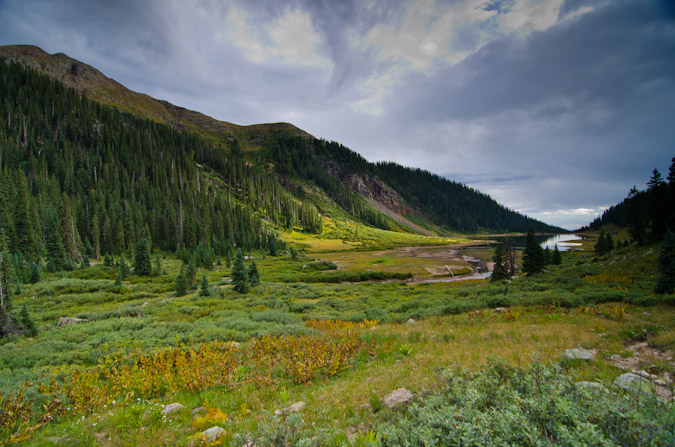
We cruised past City Reservoir and began a maddening climb out of the basin and towards Endlich Mesa. I found an interesting tree trunk to keep my attention off my aching bones.
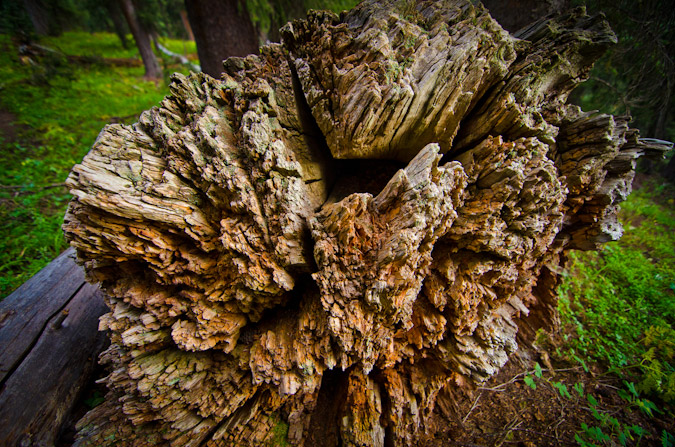
Darkness came quickly. We reached the beginning of Endlich Mesa around 9:00 PM. It was snowing. We were tired. We were hungry. We were quite certainly in foul moods. Sarah wanted food and so did I. I did not want to make camp though, so we got some light food out and ate. I confirmed our location on GPS. Only a few more miles to go. We finally reached the car at 11:30 PM and collapsed into sleeping bags in the truck. It was the best shitty night of sleep I've ever had.
This trip was the most physically demanding thing I've ever done. I pushed my body to its limits. I lost 6 pounds. I think both Sarah and I conquered some inner demons on this trip. It was, in retrospect, one of the greatest trips of my life.
Thanks for reading! I leave you with a playful creation - the world of Chicago Basin!
Citations:
1 Rhoda, Summits to Reach, pp 31-32
{fcomment}



